reform riot of 1831
reform riot of 1831
Yeovil erupts as hundreds take to the streets
-
Background
to the Riot
-
Events in
Yeovil
-
Timeline of
Events
-
Interactive
Map of
Attacked
Properties
-
Press
Reports on
the Riot
-
Descriptions
of the
Prisoners
-
The Court
Hearings
-
The
Sentences
-
The
Aftermath
-
Compensation
Claims
- Gallery
background to the riot
During the late 1820s there was ever-increasing discontent among the working-class population across the country, as demands for social, economic and political reform were being put down by reactionary governments and especially, and perhaps unsurprisingly, a hostile House of Lords. This was chiefly due to the electoral system which was corrupt and unrepresentative. At this time Members of Parliament tended to be from Britain's richest families and represented towns and boroughs where they had major control. In 1830 most of the British population was still excluded from voting, so they had no influence over the law-making process that affected their lives and consequently the poor had to endure low pay combined with harsh working conditions. Voting took place publicly so coercion became rife and, of course, the working-class people often worked for and/or lived in property owned by their MP.
In 1825 William Huskisson, President of the Board of Trade, removed all restrictions on imported gloves and exposed Yeovil glove manufacturers to unlimited competition from France. Since glove making employed something like 80% of Yeovilians, a widespread depression hit the town. To quote Hayward "The distress was real enough: outdoor relief [i.e. benefit without entering the workhouse] in the parish rose to over £600 in 1825-6 and to £1,000 in 1831-2; the Mendicity Society reported in 1832 that 1,027 persons applied for relief, of whom 927 were helped (there were 149 imposters and two were prosecuted!): Outdoor relief was given to 170 persons, mainly glove workers, in 1833." The resulting depression underlies the political unrest demonstrated by the 1831 riots and, perhaps, the activity of a nascent radical Yeovil Political Union. This combination of political and economic factors would stimulate and encourage popular collective action in Yeovil.
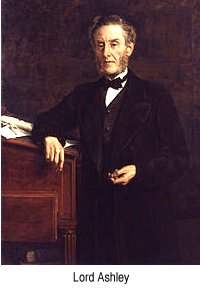 On 1 March 1830
the Reform Bill
was presented to
the House of
Commons although
this bill was
denied and four
MPs, including
the Prime
Minister Earl
Grey, resigned as
a consequence.
Shortly after
the Reform Bill
was put forward,
William
Ponsonby, the
Whig Reform
candidate, was
defeated by the
young Tory
Lord Ashley who was
voted into power
in a high
profile and nationally
advertised
Dorset
Parliamentary
election at
Dorchester
- which was
being intensely
fought on the
Reform issue - and
he refused to
let the bill
take place.
Anthony Ashley
Cooper, 7th Earl
of Shaftesbury
KG (1801-1885),
was styled Lord
Ashley from 1811
to 1851 and then
Lord Shaftesbury
following the
death of his
father.
On 1 March 1830
the Reform Bill
was presented to
the House of
Commons although
this bill was
denied and four
MPs, including
the Prime
Minister Earl
Grey, resigned as
a consequence.
Shortly after
the Reform Bill
was put forward,
William
Ponsonby, the
Whig Reform
candidate, was
defeated by the
young Tory
Lord Ashley who was
voted into power
in a high
profile and nationally
advertised
Dorset
Parliamentary
election at
Dorchester
- which was
being intensely
fought on the
Reform issue - and
he refused to
let the bill
take place.
Anthony Ashley
Cooper, 7th Earl
of Shaftesbury
KG (1801-1885),
was styled Lord
Ashley from 1811
to 1851 and then
Lord Shaftesbury
following the
death of his
father.
The revolutions taking place in Europe and the growth of radical ideas in England caused such anxiety in Yeovil, that in November 1830 two hundred and fifty Special Constables were sworn in at Yeovil and the Mudford Troop of Yeomanry Cavalry was formed as a precautionary measure.
Grey was returned to office with a majority in the subsequent general election and introduced a Second Reform Bill. This passed in the House of Commons, but on 8 October 1831, the House of Lords voted down the Second Reform Bill which had thought to slightly extend the electoral franchise and reorganise constituencies in order to diminish the power of aristocratic patronage. It has been calculated that, prior to the 1832 Reform Act, 400,000 English subjects were entitled to vote, and that after the Act, the number rose to 650,000 - an increase of more than 60% - albeit largely from the property owning middle classes, but stopping far short from representing the far-ranging demographic of the entire populace.
Nevertheless, several months of public meetings, protests and disturbances had been ignored by the Lords. Their persistent opposition offered no prospect of change through legislative democracy. As the news spread around the country, riots broke out in several cities and towns including Sherborne (20 October 1831), Yeovil (21 and 22 October 1831) and Bristol (29 to 31 October 1831).
Some in
Parliament had
recognised the
very legitimate
concerns about
the current
political
arrangements.
Problems
included the
limited number
of voters (just
5% of the
population were
eligible), the
unequal
distribution of
MPs (Cornwall,
for example, had
44 MPs compared
with the six of
today), and
influence of the
constituencies
through
patronage. The
latter included
the infamous ‘rotten
boroughs’,
where just a few
electors
returned one or
two MPs - the
same numbers as
major cities
with populations
of over 100,000
such as
Manchester or
Liverpool.
The progress of the various Reform Bills was closely followed by the general public, whose only means of expression in those days was through public demonstrations.
EVENTS IN YEOVIL
The demand for Parliamentary reform found strong support from the Radical cause in Yeovil and it appears that a nascent radical Political Union was becoming active in the town that would be officially born in the weeks to come. There was clearly a feeling of unrest in the town, which resulted in the swearing in of 250 Special Constables in November 1830 - nearly a year before the riot - and the formation of the Mudford Troop of Yeomanry Cavalry at the end of December 1830. The Mudford Troop was promoted by John Goodford JP, of Chilton Cantello, and commanded by George Harbin of Newton Surmaville.
Following the rejection of the second Reform Bill by the House of Lords and after a county election was held in Dorchester in October 1831, where Lord Ashley, an anti-reformer had defeated the Whig reform candidate William Ponsonby, trouble erupted in Blandford and Sherborne, both in Dorset, and finally in Yeovil.
Reporting on the Radical Riot at Sherborne of 20 October 1831, the 24 October edition of the Morning Post noted: "Promises of support are held out by the 'Zummerset Refarmers' from Yeovil and the neighbourhood, some of whom were conspicuous in the crowd last night, with swords concealed under their coats, swearing that they would as soon die as live in the struggle; others at the same time shouting 'Death or Victory'."
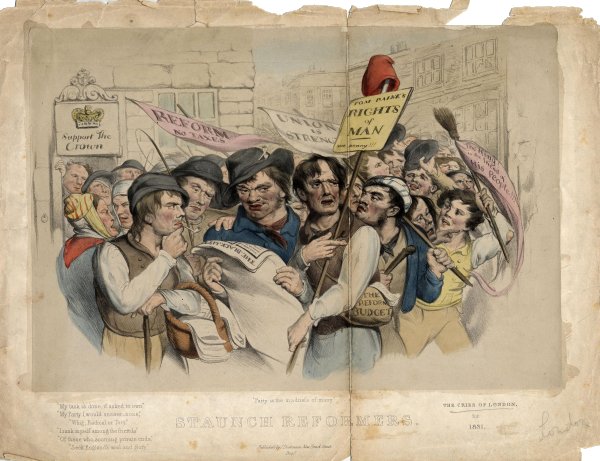
A typical handbill of the period, albeit this one is from London.
![]()
The following events, listed as far as possible chronologically, are derived chiefly from the newspaper accounts of the time - see here. For my timeline of events - see here.
Friday, 21 October 1831
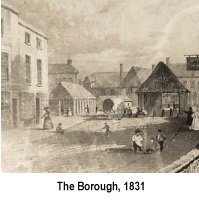 It
was reported
that at eight o'clock
in the
evening of
Friday, 21
October 1831, a
group of youths
gathered in the
Borough,
chanting
'Ponsonby;
Reform for
ever etc'. One
(questionable)
report stated
that the boys
were supplied
with stones by
women who
carried the
stones in their
aprons.
The 26 October
1831 edition of
the Taunton
Courier and
Western
Advertiser
noted the
properties of
both
53-year-old
glove
manufacturer and
banker
Henry Penny,
in the Borough,
and Rev James Hooper
"suffered" at
the hands of the
mob.
It
was reported
that at eight o'clock
in the
evening of
Friday, 21
October 1831, a
group of youths
gathered in the
Borough,
chanting
'Ponsonby;
Reform for
ever etc'. One
(questionable)
report stated
that the boys
were supplied
with stones by
women who
carried the
stones in their
aprons.
The 26 October
1831 edition of
the Taunton
Courier and
Western
Advertiser
noted the
properties of
both
53-year-old
glove
manufacturer and
banker
Henry Penny,
in the Borough,
and Rev James Hooper
"suffered" at
the hands of the
mob.
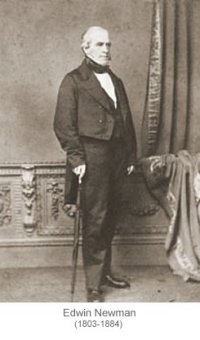 By nine
o'clock in the
evening, the
crowd had grown
to several
hundred. Lord
Ashley's agents
were accused of
corruption and
trickery in the
contest - and most
of the
solicitors in
Yeovil were
active
anti-Reformers
and had been
professional
election agents
of Lord Ashley.
Consequently
they were the
first to be
singled out by
the angry mob.
By nine
o'clock in the
evening, the
crowd had grown
to several
hundred. Lord
Ashley's agents
were accused of
corruption and
trickery in the
contest - and most
of the
solicitors in
Yeovil were
active
anti-Reformers
and had been
professional
election agents
of Lord Ashley.
Consequently
they were the
first to be
singled out by
the angry mob.
The next houses to be attacked were those of 62-year-old magistrate John Greenham in Vicarage Street and 28-year-old solicitor Edwin Newman, who lived opposite Greenham. Pigot's Directory of 1830 listed Newman as an Attorney of Vicarage Street and the 1832 poll book also recorded him living in Vicarage Street.
Of course with
the
Quedam
development of
the 1980s
Vicarage Street
disappeared, so
the location of
Newman's
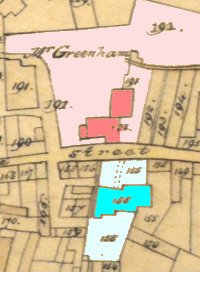 house
involves a bit
of
investigation.
However, during
the later court
case, Newman
stated that a
line of trees
along the front
of his house
later protected
it somewhat from
the missiles
aimed at it.
From Watts' 1831
map of Yeovil, only
one building is
shown in
Vicarage Street
set back from
the edge of the
road - shown in
blue at left,
with his land in
lighter blue. Watts'
1831 map labels
John Greenham's
property (shown
deep pink on the
map with his
lands in lighter
pink) on the
north side of
Vicarage Street
- opposite
Newman's
property - and
his land
was immediately
adjacent to that
of Francis
Robins', to the
north, in
Market Street.
house
involves a bit
of
investigation.
However, during
the later court
case, Newman
stated that a
line of trees
along the front
of his house
later protected
it somewhat from
the missiles
aimed at it.
From Watts' 1831
map of Yeovil, only
one building is
shown in
Vicarage Street
set back from
the edge of the
road - shown in
blue at left,
with his land in
lighter blue. Watts'
1831 map labels
John Greenham's
property (shown
deep pink on the
map with his
lands in lighter
pink) on the
north side of
Vicarage Street
- opposite
Newman's
property - and
his land
was immediately
adjacent to that
of Francis
Robins', to the
north, in
Market Street.
To return to the riot; a few boys were seen in front of Newman's house where they broke a few panes of glass and wrenched off a door knocker. This was all the damage done at this time as the mob slowly moved on. In giving evidence later at the trials, Newman said "At eight o'clock in the evening, there was an assemblage of about fifty people opposite my house. They threw stones at the house, but the trees in front protected it. They stayed for ten minutes to a quarter of an hour." The mob would, however, return later. From here it seems that this small mob progressed up Court Ash and/or North Lane to Princes Street.
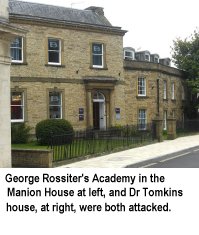 Passing
George
Rossiter's
Gentlemen's
Boarding Academy
in
Mansion House
(seen at the
left of the
photograph at
left),
a few windows
were broken by
the mob throwing
stones
indiscriminately.
Passing
George
Rossiter's
Gentlemen's
Boarding Academy
in
Mansion House
(seen at the
left of the
photograph at
left),
a few windows
were broken by
the mob throwing
stones
indiscriminately.
Magnolia House (seen at the right of the photograph at left), was the home and medical practice of 32-year-old Dr William Tomkins who spent much of the riot walking the streets and trying to quell the rioters.
The crowd,
however, were
more intent on
destroying the
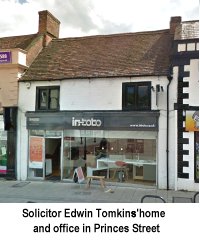 home and law
practice of Dr
Tomkins' brother
Edwin.
home and law
practice of Dr
Tomkins' brother
Edwin.
Shortly afterwards they assembled in larger numbers, in front of 40-year-old solicitor Edwin Tomkins' house in Princes Street, and smashed every window within their reach.
It was reported the mob would have broken into the house, had they not been resisted by Edwin Tomkins and his friends, who threatened to shoot the first who entered. Tomkins remained in front of the house until he was pelted with stones (one of which weighed eleven pounds).
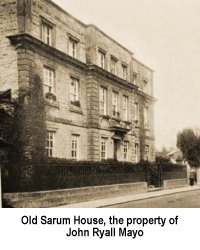 The mob then
proceeded to
attack
Old Sarum House
in Princes
Street,
the home of
wealthy
38-year-old glove
manufacturer
and
Town
Improvement
Commissioner,
later to become
Yeovil's first
Mayor,
John Ryall Mayo.
The mob then
proceeded to
attack
Old Sarum House
in Princes
Street,
the home of
wealthy
38-year-old glove
manufacturer
and
Town
Improvement
Commissioner,
later to become
Yeovil's first
Mayor,
John Ryall Mayo.
One or two windows were broken, but the attack on the house ceased when it was pointed out to the mob that Mayo was pro-Reform.
It was suggested that the attack on Old Sarum House was proof that the riot was instigated by outsiders, since locals would have been well aware of Mayo's political leanings.
Although John Ryall Mayo was pro-Reform, he was clearly shaken by the attack on his property and shortly afterwards, at the beginning of January 1832, attempted to form a Yeovil Infantry Corps. It would appear that ultimately the Yeovil Infantry Corps was not created.
It has been stated (Hayward, 1987, p74) that Glenthorne House, opposite Old Sarum House, and the home of solicitor Henry Marsh Watts was attacked in the riot. There is no evidence to validate this claim. Neither Watts nor Glenthorne House are mentioned in any newspaper articles, nor in the transcription of the trial. Further, Watts made no claim for compensation.
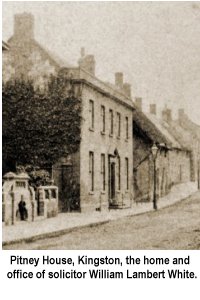 In any event,
Pitney House
at the southern
end of Kingston
was next to be
attacked. This
was the home and
law practice of
64-year-old solicitor and
banker
William Lambert
White.
In any event,
Pitney House
at the southern
end of Kingston
was next to be
attacked. This
was the home and
law practice of
64-year-old solicitor and
banker
William Lambert
White.
Yet again, a shower of stones smashed most of the windows "notwithstanding several gentlemen remonstrated with them."
The mob then marched the whole length of Kingston in order to attack Swallowcliffe House, the home of 43-year-old glove manufacturer George Mayo, the brother of John Ryall Mayo of Old Sarum House, above.
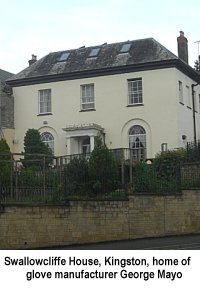 The mob attacked
Swallowcliffe
House "with
a shower of
stones, and
almost every
pane of glass
was demolished...
My papers and
deeds, plate,
and a few of my
best things are
removed. My
servant was near
losing his life;
he is much
bruised and was
profusely bled."
The mob attacked
Swallowcliffe
House "with
a shower of
stones, and
almost every
pane of glass
was demolished...
My papers and
deeds, plate,
and a few of my
best things are
removed. My
servant was near
losing his life;
he is much
bruised and was
profusely bled."
The 29 October
1831 edition of
the
Hampshire
Advertiser
reported; "In a
few minutes
afterwards the
work of
destruction was
commenced on Mr
Robins' premises
in
Ram Park."
However, I have
a problem with
this report
stating that
44-year-old
solicitor
Francis
Theophilus
Robins'
house was in Ram
Park for two
reasons;
Firstly,
Edward
Bullock
Watts'
highly
accurate
maps of
1831, 1842
and the
tithe map
of 1842 all
clearly show
that there
were no
buildings
whatsoever
in Ram Park
during this
period and
what was to
become
Park Road
was simply a
short track
alongside
Old Sarum
House with
only
outbuildings
and no other
houses.
Additionally,
for the
premises to
be "attacked
in front and
in the back
premises at
the same
time" would
be
impossible
since the
track would
only have
given access
to the front
- had there
actually
been a house
there. I
believe the
reference to
Ram Park to
be a fallacy
and this
misconception has
been
perpetuated
on the
internet.
Secondly, on 9 December 1813, Francis Robins married Elizabeth Proctor Upton (1791-1859), the daughter of Yeovil solicitor George Proctor Upton (1763-1827). Francis worked in his father-in-law's law firm, most likely before his marriage but certainly afterwards. After the death of George Proctor Upton in 1827, Francis became head of the law firm. It would appear from the census records (and confirmed by the 1846 Tithe Apportionment) that when Francis moved his family to Yeovil they lived in the house next door to his father-in-law (which was also the offices of the law practice) in Reckleford - at this time the name of today's Market Street - about halfway along the street on the eastern side of the road. The houses on the eastern side of Market Street - including both Robins' and Upton's premises - backed on to fields and orchards.
A similar erroneous note in a relatively recent book (Hayward, 1987, again) states that Francis Robins' house was in Sheep Lane (today's North Lane) - which it wasn't..
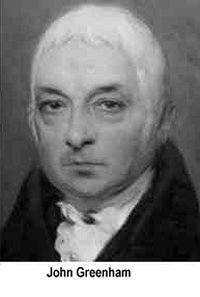 Hayward also states
that the mob
attacked "Hendford
House (Mr John Greenham)"
- today's Manor
Hotel -
even though John
Greenham never
lived there and his
son,
Frederick
Greenham,
didn't purchase
it until 1840,
nearly a decade
after the riot
and two years
after his
father's death.
At the time of
the riot, John
Greenham
actually lived
in Vicarage
Street, and this
(see map above)
is Greenham's
property that the mob
attacked.
Hayward also states
that the mob
attacked "Hendford
House (Mr John Greenham)"
- today's Manor
Hotel -
even though John
Greenham never
lived there and his
son,
Frederick
Greenham,
didn't purchase
it until 1840,
nearly a decade
after the riot
and two years
after his
father's death.
At the time of
the riot, John
Greenham
actually lived
in Vicarage
Street, and this
(see map above)
is Greenham's
property that the mob
attacked.
I believe that the bulk of the mob moved down either, or both, North Lane or Court Ash in order to attack the properties of 32-year-old solicitor John Slade and solicitor Francis Theophilus Robins, both in Market Street, and then glove manufacturer John Greenham's and solicitor Edwin Newman's properties, both in Vicarage Street - all were political agents for Lord Ashley.
Several newspapers published an anonymous "extract of a letter" believed to have been penned by John Greenham, in which he states "Every pane of glass, except one, in the front and side-front of my house was broken, and with great difficulty the back part was saved." Edwin Bullock Watts' sketch map of 1829 shows the house of John Slade on the eastern side of Market Street, then known as Rackleford, about fifty yards along from the Pall Inn. (Around 1840 he would buy Penn House and move there). John Slade was in partnership with William Lambert White (see above) until 1833, when the partnership was dissolved. It is almost certain therefore, that Slade's Market Street property was his home rather than his office in 1831 - certainly by 1840, his office was at 4 Church Street. There is little mention in the press about the attack on John Slade's home, so the damage was probably little more than a few broken windows. Indeed, he only claimed £13.18s.0d for compensation (about £1,300 at today's value).
As a side-note, when the Mudford Troop of Yeomanry Cavalry was formed in December 1830, John Slade was commissioned Cornet of the Troop (Cornet was originally the lowest grade of commissioned officer in a British cavalry troop, the modern equivalent being a second lieutenant. The Cornet was the bearer of the Troop's flag, or Cornet.)
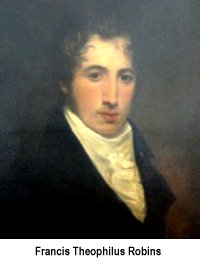 The
mob continued a
few yards
further north
along Market
Street, to the
home and office
(see photo
above) of solicitor Francis
Theophilus
Robins (1787-1849). While
the front of
this property
was on the
street, the rear
backed on to
orchards and
fields - as he
later described
in his
testimony.
The
mob continued a
few yards
further north
along Market
Street, to the
home and office
(see photo
above) of solicitor Francis
Theophilus
Robins (1787-1849). While
the front of
this property
was on the
street, the rear
backed on to
orchards and
fields - as he
later described
in his
testimony.
At the trials, Robins stated; "On Friday, the 21st of October, soon after ten o'clock in the evening, I saw a mob, consisting of several hundreds, coming down a field in which my house stands. A brick wall, five feet high, divides my garden from that field. They pushed down the wall. Mrs Robins was so alarmed that she insisted on going to a cottage near. I heard the destruction of the windows and doors of my house, apparently accomplished with stones, sticks and bricks. The mob continued there two hours. The windows and shutters were completely demolished. Every window in the house was destroyed. The damage done amounted to more than £300 (about £24,000 at today's value)."
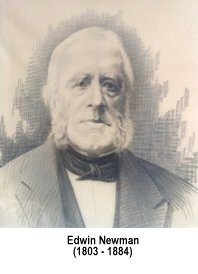 Around 11.30pm,
this mob moved
around the
corner, into Vicarage
Street, to
attack the house
of Edwin Newman
for a second
time. At the
later trials,
Newman stated;
"About half-past
eleven, a
violent mob,
consisting of
several
hundreds, came
to my house.
They attacked
the front gate,
shouting and
making a noise.
After much
labour and
pains, they got
through into the
yard. They then
violently
attacked the
windows and
doors with
stones and
sticks. They
broke down the
office window;
they got in,
whereupon I
moved from the
front door where
I had required
them to desist,
and told them I
have a loaded
pistol and would
fire on them. I
went to the
inner door of
the office, and
stood there. I
said, "You have
broken my
windows, be
satisfied and be
off." and
assured them if
they made their
appearance I
would draw the
trigger of my
pistol which I
held in my hand.
During that time
another party
were
endeavouring to
break in my
front door.
Hearing the
screams of my
wife, who was
upstairs with
her two infant
children, she
being at that
time in a very
delicate
situation, I
left the office
door and went to
her. I then
heard them break
in the front
door. Mr Tomkins
came in, and
entreated my
wife to leave
the house. She
refused, unless
I would join
her: at last I
accompanied her
and the
children. They
were breaking
the furniture
all over the
house. In going
out I passed the
front door; it
was completely
broken. There
were several
hundreds
collected. I
went back to my
house between
four and five
the next
morning. I then
found the doors,
shutters and
windows battered
completely to
pieces. There
was only one
pane left in
front. The
framework was
entirely
demolished. I
was obliged to
have a new
office door. At
the back of the
house, the
dining room
windows and
frames were
entirely broken
and destroyed.
The furniture
was injured to a
considerable
amount. I have
recovered a
verdict against
the hundred for
£250 (about
£20,000 at
today's value).
I was engaged by
Lord Ashley at
the Dorset
election."
Edwin Newman
later claimed
compensation in
the sum of
£1,000 for
damages caused
during the riot
(about £93,000
at today's
value).
Around 11.30pm,
this mob moved
around the
corner, into Vicarage
Street, to
attack the house
of Edwin Newman
for a second
time. At the
later trials,
Newman stated;
"About half-past
eleven, a
violent mob,
consisting of
several
hundreds, came
to my house.
They attacked
the front gate,
shouting and
making a noise.
After much
labour and
pains, they got
through into the
yard. They then
violently
attacked the
windows and
doors with
stones and
sticks. They
broke down the
office window;
they got in,
whereupon I
moved from the
front door where
I had required
them to desist,
and told them I
have a loaded
pistol and would
fire on them. I
went to the
inner door of
the office, and
stood there. I
said, "You have
broken my
windows, be
satisfied and be
off." and
assured them if
they made their
appearance I
would draw the
trigger of my
pistol which I
held in my hand.
During that time
another party
were
endeavouring to
break in my
front door.
Hearing the
screams of my
wife, who was
upstairs with
her two infant
children, she
being at that
time in a very
delicate
situation, I
left the office
door and went to
her. I then
heard them break
in the front
door. Mr Tomkins
came in, and
entreated my
wife to leave
the house. She
refused, unless
I would join
her: at last I
accompanied her
and the
children. They
were breaking
the furniture
all over the
house. In going
out I passed the
front door; it
was completely
broken. There
were several
hundreds
collected. I
went back to my
house between
four and five
the next
morning. I then
found the doors,
shutters and
windows battered
completely to
pieces. There
was only one
pane left in
front. The
framework was
entirely
demolished. I
was obliged to
have a new
office door. At
the back of the
house, the
dining room
windows and
frames were
entirely broken
and destroyed.
The furniture
was injured to a
considerable
amount. I have
recovered a
verdict against
the hundred for
£250 (about
£20,000 at
today's value).
I was engaged by
Lord Ashley at
the Dorset
election."
Edwin Newman
later claimed
compensation in
the sum of
£1,000 for
damages caused
during the riot
(about £93,000
at today's
value).
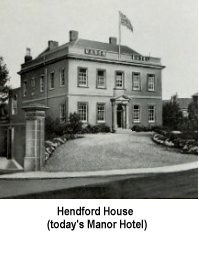 Although
it is claimed
(Hayward, 1987,
p74 - yet
another error!) that
Hendford House
- today's Manor
Hotel, was
attacked during
the riot, it was
almost certainly
not attacked.
Hayward also
claimed it to be
the home of John
Greenham - who
never lived
there.
Although
it is claimed
(Hayward, 1987,
p74 - yet
another error!) that
Hendford House
- today's Manor
Hotel, was
attacked during
the riot, it was
almost certainly
not attacked.
Hayward also
claimed it to be
the home of John
Greenham - who
never lived
there.
John Daniell the Younger, took over the family banking business and the family home, Hendford House, in 1797. On his death in 1819 his daughter Elizabeth Clarke Daniell inherited Hendford House. She married the Rev. Arthur Johnson of Rampisham, Dorset, in 1829.
In 1827 Hendford House was advertised, offering vacancy of the building on a fully-furnished rental basis. The benefits of the house included "stabling for five horses, a coach house, saddle house and every requisite building." Further, with the house was offered "a good pew in Yeovil church and a seat for the servants." It is likely therefore that during the riots the house was unoccupied or at least only had temporary residents - it was certainly not the home of Frederick Greenham at this time, as has been recorded in several books as well as the internet. Indeed, the Rev. Johnson sold the house to Henry Penny of Yeovil (see the first attack above) in 1833. In 1840 Penny, in turn, sold it to Frederick Greenham, Esq., - described as 'a gentleman' and a Town Commissioner.
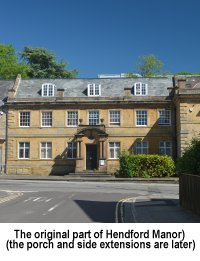 The mob
moved south,
along Hendford, in
order to
attack
Hendford Manor.
The Rev James
Hooper,
inherited
Hendford Manor
on his father's
death in 1824.
It was reported
that "All Mr
Hooper's front
and greenhouse"
windows were
destroyed in the
attack of 21
October.
James Hooper
became Rector of
Kingweston and
sold the house
in 1840 to his
brother-in-law
attorney Edwin
Newman whose
property
sustained such
damage during
the riot.
The mob
moved south,
along Hendford, in
order to
attack
Hendford Manor.
The Rev James
Hooper,
inherited
Hendford Manor
on his father's
death in 1824.
It was reported
that "All Mr
Hooper's front
and greenhouse"
windows were
destroyed in the
attack of 21
October.
James Hooper
became Rector of
Kingweston and
sold the house
in 1840 to his
brother-in-law
attorney Edwin
Newman whose
property
sustained such
damage during
the riot.
Following the attack on this private residence, the mob re-assembled in the Borough and High Street. By about four o'clock in the morning, the crowd had finally dispersed.
Saturday, 22 October 1831
The Mudford Troop of Yeomanry, under the command of Captain George Harbin of Newton Surmaville, assembled the following morning, Saturday, 22 October. They were later joined by the Martock Troop of Yeomanry under the command of Captain Tatchell. During Saturday the Yeomanry patrolled the streets and brought a small measure of calm to the town.
Throughout Saturday there was an undercurrent of general disquiet in the town and the Western Flying Post reported; "A meeting of inhabitants was held at the Mermaid Inn, when it was resolved that all legal means should be used to prevent a repetition of such disgraceful outrages." Several magistrates, including John Goodford JP, of Chilton Cantello, were present at the meeting in the Mermaid. By late afternoon the crowds were once again congregating in the Borough and anxiety over further possible rioting was increased by reports of people coming in from the surrounding villages. Consequently, the magistrates had earlier sent for the Mudford and Martock Troops of Yeomanry Cavalry to support the Special Constables and public officers who had proved powerless in defending property during Friday’s riot. At about a quarter to seven in the evening, news came to the Mermaid that plans were being made to attack Mr Hooper’s property, Hendford Manor, in Hendford again. Thomas Hoskins (not John Goodford as incorrectly stated yet again by Hayward), one of the magistrates, read the Riot Act requiring the crowd to disperse, failing which, action would be taken against them. Although this had the effect of quieting the mob they refused to disperse.
|
The
Riot
Act,
1714 "Our Sovereign Lord the King chargeth and commandeth all persons, being assembled, immediately to disperse themselves, and peaceably depart to their habitations, or to their lawful business, upon the pains contained in the Act made in the first year of King George the First for preventing tumults and riotous assemblies."
GOD SAVE
THE KING |
The 26 October 1831 edition of the Taunton Courier and Western Advertiser reported; "Saturday night several ill-disposed fellows came, armed with bludgeons (and many of them with bags), from the country, and no doubt remains that had not our military, the Mudford and Martock troops of Yeomanry, been at hand, half the town would that night have been sacked, as the object of the populace was plunder. Nine Magistrates were sitting the whole of Saturday night and the troops paraded the town. One charge was made as the Mermaid windows were being broken, and many of the crowd were severely cut; some stones were thrown from the tops and over the houses; scarcely a man in the Mudford troop but received some blows in this way.
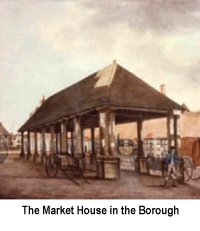 Many
single shots
were fired at
the rioters as
they stood
behind the
pillars of the
Market House,
but I have not
heard of any one
being wounded
till an order
was given for
six men to fire
ball. Four fired
in the air, and
two fired
amongst the
populace. One
man immediately
cried out, and
said he must be
taken home."
Many
single shots
were fired at
the rioters as
they stood
behind the
pillars of the
Market House,
but I have not
heard of any one
being wounded
till an order
was given for
six men to fire
ball. Four fired
in the air, and
two fired
amongst the
populace. One
man immediately
cried out, and
said he must be
taken home."
In his letter, dated "Yeovil, Saturday night, nine o'clock", Magistrate John Greenham of Vicarage Street wrote: "Since I began this, the mob have passed my house, and the Martock Troop of Yeomanry at their heels; the Mudford Troop are also out, parading the town." Clearly indicating that the mob were also roving around the town, being chased by the Yeomanry Cavalry as well as milling about in the Borough and High Street.
The rioters were threatening to sack the town and pelted the Yeomanry with stones and other missiles. However the Yeomanry arrested two of the mob and took them to the Mermaid Inn where the Magistrates were gathered. The Mermaid Inn was attacked, windows broken, and the rioters attempted to rescue those that had been arrested. It was reported by the Western Flying Post that the Mudford Troop "left the town under the idea that their presence might be the means of bringing together a crowd."
It was variously reported that consequently, the Martock Troop of Yeomanry were instructed to fire "four in the air, and two at the rioters" (the order to fire was later denied) or that six shots were fired without the order being given. One of the rioters was wounded and heard to cry out in pain, and one of the Yeomanry, a Trooper named Charles Cottle of the Martock Troop, accidentally shot himself in the thigh. John Greenham's published letter recorded; "Potter, the barber, and a mason of the name of Sylvester, are in custody, George Soper has a sabre-wound, and Parkhouse, another barber, was out drunk and ridden over. Capt. Tatchell, I hear, acted most determinedly."
The crowd finally dispersed although the Yeomanry had to provide constant patrols through the night to keep the streets clear and maintain order.
Sunday, 23 October 1831
On the Sunday morning, a detachment of the 3rd Dragoon Guards, a troop of regular cavalry normally stationed in Taunton, arrived from Sherborne, where they had been keeping the peace, and order was finally restored in Yeovil.
The 3rd Dragoon Guards remained in Yeovil for a fortnight. The previous November, 250 Yeovilians had been sworn in as Special Constables and, following the riot, a large number of these Special Constables made daily patrols of the streets throughout the next four months.
To show their appreciation of the good conduct of the troops, the townspeople of Yeovil subscribed £225 (roughly £18,000 at today's value) and presented every member of the Mudford Troop of Yeomanry with an inscribed 'Riot Jug' (see photograph and description below). Since the Mudford Troop "left the town" during the Saturday night riot, leaving the Martock Troop to quell the rioters, it seems a little unfair that the officers and men of the Martock Troop were not similarly rewarded.
The damage caused by the rioters was considerable, with Edwin Newman's and Francis Robins' homes receiving the greatest amount of damage with doors and windows smashed, furniture destroyed and much liquor drunk. Newman's final estimate of the damage to his property was variously reported, depending on the source, to be £250 (about £20,000 at today's value) or £1,000 (about £80,000 at today's value) while the damage done to Robins' home amounted to more than £300 (about £24,000 at today's value).
Timeline of Events
| TIME | LOCATION | WITNESS | ACTION | SOURCE | |
| Friday 21 Oct 1831 | |||||
| 8:00pm | The Borough | disorderly boys assembling, and shouting | HA | ||
| 8:05pm | Newman's - Vicarage St | Edwin Newman | 50 persons present @ Newman's - throwing stones | WFP | |
| 8:15pm | Newman's - Vicarage St | Edwin Newman | 50 persons leave Newman's | WFP | |
| 9:00pm | The Borough | Mob increases but moves on from Borough ay this time | HA | ||
| 9:15pm | Edwin Tomkins' - Princes St | Tomkins' windows smashed | HA | ||
| 9:15pm | John Ryall Mayo's - Princes St | Few windows broken, mob told he was pro-reform | HA | ||
| 10:00pm | FT Robins' - Market Street | FT Robins | mob (hundred) from field demolish wall and attack house | WFP | |
| 10:00pm | John Goodford, Chilton Cantello | J Goodford JP | Goodford hears of riot, dresses and rides to Yeovil | WFP | |
| 10:30pm | Princes Street | Dr W Tomkins | saw persons passing to Mr White's | WFP | |
| 10:35pm | White's - Pitney Ho, Kingston | Dr W Tomkins | 100 persons - breaking windows | WFP | |
| 10:45pm | Mayo, Swallowcliffe Ho, Kingston | Dr W Tomkins | several hundreds - threw stones | WFP | |
| 10:50pm | Mob moves to Robins' - Market St | Dr W Tomkins | mob on the move from Kingston to Market Street | WFP | |
| 11:00pm | Mob divides into two; | Part mob stays at Robins', part to Borough | HA | ||
| 11:00pm | Part of Mob returns to Borough | all windows of Mr Penny's house in Borough broken | HA | ||
| 11:00pm | Tomkins from Robins' to Slade's | Dr W Tomkins | Tomkins moves from Robins' | WFP | |
| 11:15pm | Tomkins returns to Robins' | Dr W Tomkins | Numbers increased - stones thrown | WFP | |
| 11:15pm | Goodford arrives Vicarage St | J Goodford JP | This time is likely incorrect, more likely 11.55pm | WFP | |
| 11:25pm | Mob moves to Vicarage St | Dr W Tomkins | mob on the move from Market Street to Vicarage Street | WFP | |
| 11:30pm | Greenham's - Vicarage St | Dr W Tomkins | "They at first threw stones at Mr Greenham's house" | WFP | |
| 11:30pm | Newman's - Vicarage St | Edwin Newman | mob - several hundreds - attack Newman's house | WFP | |
| 11:30pm | Newman's - Vicarage St | Edwin Newman | Mr Tomkins arrives @ Newman's | WFP | |
| 11:30pm | Newman's - Vicarage St | Dr W Tomkins | Tomkins takes Mrs Newman to his home (Magnolia Ho). | WFP | |
| 11:30pm | Newman's - Vicarage St | Edwin Newman | Newman & family leave | WFP | |
| 11:45pm | Newman's - Vicarage St | Dr W Tomkins | Tomkins returns to Newman's | WFP | |
| 11:50pm | Newman's - Vicarage St | Samuel Rolls | Mob tries burn Newman's, Rolls & brother extinguish | WFP | |
| 11:55pm | Newman's - Vicarage St | Dr W Tomkins | John Goodford addresses crowd | WFP | |
| Saturday 22 Oct 1831 | |||||
| 12:00am | FT Robins' - Market Street | FT Robins | mob start to leave Robins' house | WFP | |
| 12:05am | Newman's - Vicarage St | Dr W Tomkins | Mob slowly leaves Newman's | WFP | |
| 12:20am | Newman's - Vicarage St | J Goodford JP | Mob finally out of Newman's | WFP | |
| 12:30am | Mermaid Inn - High Street | J Goodford JP | Goodford arrives at Mermaid Inn | WFP | |
| 12:30am | FT Robins' - Market Street | FT Robins | Robins returns home to inspect; most of mob gone | WFP | |
| 1:30am | Mermaid Inn - High Street | J Greenham (?) | Magistrates leave the Mermaid | TC | |
| 3:00am | Various locations | town becomes "comparatively tranquil" | HA | ||
| 4:00am | Various locations | un-named letter | Mob finally disperses | TC | |
| 4:00am | Newman's - Vicarage St | Edwin Newman | Newman returns home to inspect damage | WFP | |
| 5:00am | Mermaid Inn - High Street | J Goodford JP | Goodford leaves Mermaid, to Hooper's Hendford Manor | WFP | |
| 5:30am | Hendford Manor | J Goodford JP | Goodford addresses crowd at Hendford Manor - by daylight | WFP | |
| 5:30am | John Greenham's - Vicarage St | J Greenham (?) | Greenham arrives home from the election | TC | |
| Unspecified | J Goodford JP | Goodford calls out the Yeomanry | Various | ||
| 8:00am | John Goodford, Chilton Cantello | J Goodford JP | Goodford arrives back at home - Chilton Cantello | WFP | |
| 6:00pm | Mermaid Inn - High Street | Thomas Hoskins | Hoskins arrives at the Mermaid, hundreds in the street | WFP | |
| 6:45pm | Mermaid Inn - High Street | Thomas Hoskins | "something going on at Rev Hooper's [Hendford Manor]" | WFP | |
| 6:45pm | Mermaid Inn - High Street | Thomas Hoskins | Hoskins reads the Riot Act | WFP | |
| Unspecified | Mudford Troop | Mudford Troop "left the town" | Various | ||
| Unspecified | Martock Troop | Fire "four in the air, and two at the rioters" | Various | ||
| Unspecified | Mudford Troop | Mudford Troop return to town | Various | ||
| Unspecified | Riot Mob | Crowd finally disperses | Various | ||
| Unspecified | Yeomanry | Provided constant patrols "through the night" | Various | ||
| Sunday 23 Oct 1831 | |||||
| Unspecified | Dragoons | 3rd Dragoon Guards (regular cavalry) arrive | Various | ||
| Unspecified | Dragoons | Order finally restored in Yeovil | Various | ||
| Unspecified | Dragoons | 3rd Dragoon Guards remain for two weeks | Various | ||
| Unspecified | Constables | Special Constables make daily patrols for 4 months | Various | ||
TC = Taunton
Courier - 26
October 1831
HA = Hampshire
Advertiser - 29
October 1831
WFP = Western
Flying Post - 9
April 1832
(trial report)
Map of Attacked Properties
NOTE: This is an interactive map - click on any property to go to that property's page.
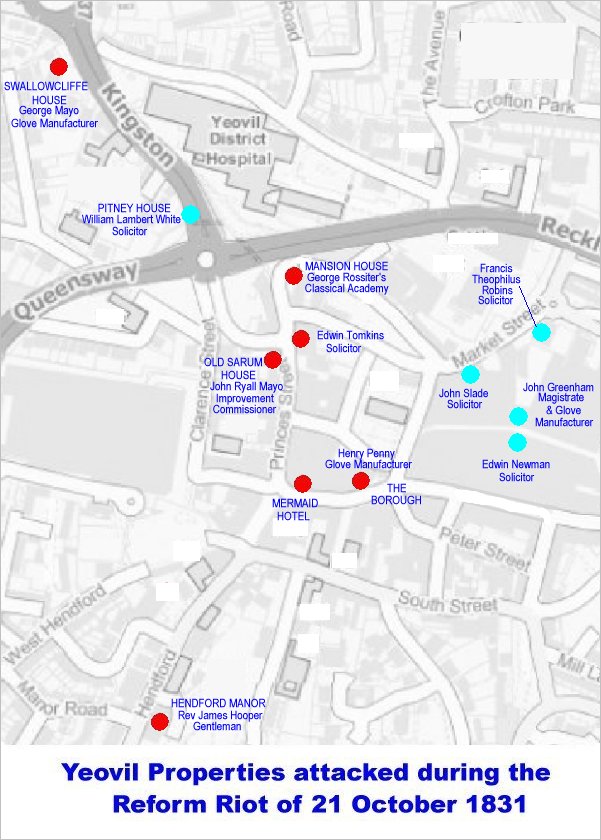
This map shows the properties that were attacked during the rioting. Those buildings marked with a red spot still exist, while those marked with a blue spot were attacked during the riot, but demolished in the twentieth century.
press reports on the riot
As today, the press reported on the riot depending on their political bias and with various degrees of accuracy (and even disbelief in Cornwall). The following reports are, more or less, in date order. Many newspaper reports of the riot were repeated in other organs, most of which are omitted here. Further, some newspaper reports contained incorrect facts which, apparently, have been perpetuated in various modern books and on the internet.
All comments appearing in [square brackets] are mine.
The Western
Flying Post,
in its edition
of 29 November
1830 - nearly a
year before the
1831 Riot -
was, perhaps, a
vision of events
to come.
"The Magistrates
of the Yeovil
Division
assembled on
Saturday morning
at the Mermaid
Inn, and, as a
measure of
precaution,
swore in upwards
of two hundred
and fifty of the
inhabitants as
Special
Constables. The
best spirit
appears to
prevail in the
town, and the
inhabitants, of
all classes, are
prepared to
render every
assistance to
the Magistrates
in putting down
all attempts to
disturb the
public peace,
and preventing
the destruction
of property."
![]()
The
Cheltenham
Journal and
Gloucestershire
Fashionable
Weekly Gazette
(snappy title)
edition of 3
January 1831
was also aware that
trouble seemed
to be brewing,
some ten months
before the
actual Yeovil
riot took place.
![]()
""We hear that a most respectable troop of Yeomanry Cavalry has been formed through the unremitting exertions of that able magistrate, John Goodford esq of Chilton, Somerset, by whom in the course of a few days, have been enrolled seventy respectable yeomen who are to be commanded by G Harbin esq of Newton House, near Yeovil, and are to be called the 'Mudford Troop'."
![]()
One of the first reports of the riot from the 24 October 1831 edition of the Western Flying Post or Sherborne Mercury. Sherborne had also suffered serious disturbances.
"We regret to state that, in addition to what has occurred in our town [ie Sherborne], great rioting, and consequent destruction of property, have taken place at Yeovil. Not content with demolishing the windows, we understand the rioters have entered the houses and offices of several gentlemen; as well reformers as anti reformers, and committed the most appalling excesses. The office of one legal gentleman, we are informed, was broken into, and deeds and other legal instruments destroyed, occasioning a loss of several hundred pounds. The names of several gentlemen have been mentioned, but hearing them but by report, we deem it proper to withhold them. On Saturday evening, in consequence of an express, a part of the 3rd Dragoon Guards left Sherborne for Yeovil, and was replaced by another detachment from Dorchester. We understand the town continued in a state of great excitement during the day, but we had not heard, at the time of our going to press, what or whether any rioting had taken place during the night; the most serious apprehensions, however, were entertained for the peace of the town."
![]()
The following "extract of a letter" is from the 26 October 1831 edition of the Taunton Courier and Western Advertiser and repeated in at least a dozen other newspapers.
Note: although it is not stated who wrote the letter, the fact that he refers to "the front and side-front of my house" and does not mention his own name, strongly suggests that the letter was written by glove manufacturer and agent to Lord Ashley, John Greenham of Vicarage Street, who lived opposite Edwin Newman.
"Extract of a Letter, dated Yeovil, Saturday night, nine o'clock :- "I arrived home in safety about half past five o'clock. I found that last night serious rioting had taken place. Every pane of glass, except one, in the front and side-front of my house was broken, and with great difficulty the back part was saved. Mr Tomkins, Mr White, Mr Edwin Newman, Mr Robins, Mr Slade (all professional agents to Lord Ashley) Mr Penny, and Mr Hooper have suffered. Messrs Newman and Robins not only had their windows broken in, but their houses entered, and every article of furniture, liquor, and papers, destroyed. Since I began this, the mob have passed my house, and the Martock Troop of Yeomanry at their heels; the Mudford Troop are also out, parading the town. Opposite Mr John Mayo's house the mob gave three cheers for him and Reform. I have not been out, except for a few minutes to Mr Randall's. My papers and deeds, plate, and a few of my best things are removed. My servant was near losing his life; he is much bruised and was profusely bled. James Acreman lost three teeth, and Farmer Buck was taken up senseless. I cannot enter more into particulars.
Sunday morning,
six o'clock - We
are safe through
the night. I
hear that
several shots
were fired, and
many wounded
with the sword,
and a few taken
into custody.
The Magistrates
sat in the
Mermaid till
one or two
o'clock, when
the people had
nearly
dispersed, and
the troop
paraded all
night. The
windows of the
Mermaid were
broken in, and
all Mr Hooper's
[Hendford Manor] front and
greenhouse, and
some of Mr
Rossiter's
[Mansion House]; I
have not heard
of any others.
Potter, the
barber, and a
mason of the
name of
Sylvester, are
in custody,
George Soper has
a sabre-wound,
and Parkhouse,
another barber,
was out drunk
and ridden over.
Capt. Tatchell,
I hear, acted
most
determinedly."
The following
report is also from
the 26 October
1831 edition of
the Taunton
Courier and
Western
Advertiser
and reproduced
in several other
newspapers -![]()
Extract of a Letter, dated Yeovil Tuesday (Yesterday) Oct 25 - "On Friday several suspicious-looking persons attended our market [the Borough]; the rioting began before eight o'clock in the evening; the greater part of the mob were boys, who were supplied with stones by women, who carried them in their aprons; men attended with bludgeons, and as soon as any of the children were arrested they were immediately set at liberty, and the persons interfering were knocked down. The yeomanry were mostly living at a distance, and therefore could not be had together until the next morning.
The mob dispersed about four o'clock, after having entered Mr Robins' and Mr Newman's houses, and regaled themselves. The house of the former I have seen - not a piece of furniture is left in the two parlours, the mantel-pieces, fire-irons, two book-cases, with their contents, a piano, and all the chairs and tables, were broken to pieces, and a great part of them consumed. The glass and ware in the kitchen were all broken smaller than the stones in the road, and a cask of gooseberry wine, and eight or ten dozen bottles of foreign [wine], with brandy and spirits, were carried into the garden and consumed, a great part by women. As the mob carried everything before them on Friday, they gave out that that night they had only had a jig and the following night they meant to have a dance. Mr Newman's house is a complete wreck, and was served as Mr Robins'; the latter estimates the damage done at £500, the former at £1,000.
Saturday night several ill-disposed fellows came, armed with bludgeons (and many of them with bags), from the country, and no doubt remains that had not our military, the Mudford and Martock troops of Yeomanry, been at hand, half the town would that night have been sacked, as the object of the populace was plunder. Nine Magistrates were sitting the whole of Saturday night and the troops paraded the town. One charge was made as the Mermaid windows were being broken, and many of the crowd were severely cut; some stones were thrown from the tops and over the houses; scarcely a man in the Mudford troop but received some blows in this way. Many single shots were fired at the rioters as they stood behind the pillars of the Market House, but I have not heard of any one being wounded till an order was given for six men to fire ball. Four fired in the air, and two fired amongst the populace. One man immediately cried out, and said he must be taken home.
There was in the Borough, last night, a little hissing and groaning at the cavalry, but they have done their work nobly, and have shown great forbearance. This night has passed off as quietly as if nothing had happened. About ten or twelve men have been sent to the gaol at Ilchester, most of them belonging to the town. The yeomanry escort them otherwise a rescue would be attempted, as was the case when the Mermaid windows were broken. A boy has made a confession, and also a man, and some of the stolen property has, in consequence, been recovered."
The following
report is from
the 29 October
1831 edition of
the
Hampshire
Advertiser. "At Yeovil
the first
symptoms of
disorder
commenced at
eight o'clock in
the evening of
Friday, in the
Market Place
[the Borough], by
a few disorderly
boys assembling,
and shouting
Ponsonby;
Ashley; and
Reform for ever,
&c. [since
they were
protesting
against him, why
they would shout
'Ashley' is
something of a
mystery]. They were
remonstrated
with, and
several
gentlemen
attempted to
disperse them,
but with little
effect. They
increased in
number until
nine o'clock,
when they left,
and persons
residing near
the Market Place
supposed they
had quietly
dispersed. In a
few minutes
afterwards, a
few boys were
seen in front of
Mr E Newman's
house; they
broke a few
panes of glass
in his house,
and wrenched off
a knocker, which
was the extent
of the injury
they then did
there. Shortly
afterwards they
assembled in
larger numbers,
in front of Mr
Edwin Tomkins'
house, and
smashed every
window within
their reach, and
would have
broken into the
house, had they
not been firmly
resisted by Mr
Tomkins and his
friends, who
threatened to
shoot the first
who entered,
having remained
in front of the
house till a
shower of stones
(one of which
weighed eleven
pounds)
compelled them
to retreat. One or two
windows were
broken at Mr
John Mayo's [Old
Sarum House],
but the
multitude
understanding
that he was a
friend to the
measure of
Reform, desisted
from further
aggression. They
had by this time
increased to a
considerable
number, and
proceeded to the
residence of Mr
W L White, esq.
[Pitney House] and the work of
demolition
instantly
commenced,
notwithstanding
several
gentlemen
remonstrated
with them. They
then attacked Mr
G Mayo's windows
[Swallowcliffe
House] with a
shower of
stones, and
almost every
pane of glass
was demolished.
[Note
- I would have
thought that
only a portion
of the mob would
have gone all
the way along
Kingston and
back just to
throw stones at
George Mayo's
Swallowcliffe
House.] In a few
minutes
afterwards the
work of
destruction was
commenced on Mr
Robbins'
premises in Ram
Park [see note
below]. This
gentleman's
house was
attacked in
front and in the
back premises at
the same time.
The windows were
soon demolished
- they rushed
into the house -
and an
indiscriminate
destruction of
property took
place. Every
article that
could be
destroyed was in
a few seconds
broken to
pieces; books,
papers and
furniture all
shared the same
fate, and some
of the servants
clothes, which
the mob was
requested to
save, were
recklessly
destroyed or
carried away.
Some portion of
the dresses that
could not be
easily borne
off, was thrown
into the fire,
and it was only
through the
assistance of
some, who at
great risk,
mingled with the
crowd, that the
house was not
burnt to the
ground, as they
kindled the fire
with that
intent." "Mr W Tomkins, surgeon, of this town, with the assistance of a workman,
made an effort,
in the early
part of the
attack, to clear
the room first
broken into by
the rioters, and
they had
partially
succeeded in
driving them
out, and would
have maintained
their ground had
not the attempt
been made to set
fire to the
house. They here
seemed for a
time satiated
with the
mischief they
had done, and it
was hoped they
would have
retired; every
exertion was
made by the
respectable
portion of the
inhabitants to
prevent any
further
mischief, as
they could not
from the
suddenness of
the attack, act
in concert, but
little effect
was produced. About eleven
o'clock the mob
separated into
two parties, the
one remained at
Mr Robbins's,
the other
proceeded
through the
Borough, and in
passing Mr
Penny's house,
they broke every
window in the
front of it. [I
believe that
before this
event, part of
the mob had
already split
off in order to
wander along
Kingston]. A party went
to Mr Slade's
house [in Market
Street] - they
demolished his
windows, and
again attacked
Mr Newman's [in
Vicarage Street],
where the doors
were forcibly
broken open, and
a scene of
devastation
similar to that
of Mr Robbins's
took place. Mr
Newman's office
was broken into,
and his papers
were thrown
about in every
direction.
Whilst they were
ransacking the
house, several
gentlemen
mingled in the
crowd, and saved
the more
valuable
documents at
personal risk. The town had
now been in a
state of utmost
confusion for
nearly five
hours, when John
Goodford, esq.
rode promptly
and firmly
amongst the
crowd, and
expostulated
with them on the
folly of their
proceedings, and
entreated them
to disperse; he
told them he
came entirely
unarmed amongst
them and wished,
as their friend,
to point out to
them the danger
they were in. Mr
Goodford's calm
address was
attended to, and
with the
exception of a
little damage
done to Mr
Hooper's
windows
[Hendford Manor], no
further mischief
was done. The
town, by three
o'clock, became
comparatively
tranquil. On Saturday,
from the reports
that had been
spread, the
inhabitants
expected a
repetition of
last night's
proceedings, and
there is not the
least doubt but
that the
destruction of
property would
have been
greater than the
preceding night,
as great numbers
of persons were
seen coming in
from the
country, had not
the Mudford
Troop of
Yeomanry
arrived. They
came into the
town in the
evening, and
drew up in front
of the Mermaid.
They soon after
left the town
under the idea
that it was
possible their
presence might
be the means of
bringing
together a
crowd; but,
notwithstanding
this prudential
conduct, the mob
collected, and
again commenced
their riotous
proceedings. Wm.
Hoskins, esq.
was in the town,
with the
Magistrates of
the Division,
and he read the
Riot Act, and
earnestly
requested the
mob to disperse,
which they
refused to do;
and eventually
on the arrival
of the Martock
Troop, the
Yeomanry were
obliged to clear
the streets by
main force. A
mere display of
power was of no
avail; and it is
a great honour
to the Yeomanry,
that
notwithstanding
every insult was
heaped on them
by the rioters,
they did their
duty manfully
and temperately.
The streets were
cleared by their
exertions in a
short time, and
in effecting
this, they did
but little
personal injury
to any one. We have now a
detachment of
the 3rd
Dragoons. The
Yeomanry are
dismissed, and
the town has
assumed its
usual peaceful
appearance, and
there is no fear
of a recurrence
of these
disgraceful
proceedings.
After what has
passed, it is
natural that the
attention of the
public should be
directed to the
origin of the
riot, and it is
the opinion of
those best
calculated to
form a judgement
on the subject,
that persons,
entire strangers
to the town,
were the
instigators of
it, and that a
preoncerted plan
was acted on.
They are more
inclined to this
opinion from
several
circumstances
that occurred. A
few panes of
glass were
broken at a
gentleman's
house; a person
called out "this
is not the
house, it is a
house in a green
we must go to,"
and the crowd
immediately left
the house [this was
John Ryall
Mayo's Old Sarum
House]. If the
leaders had not
been strangers,
they could not
have made the
mistake. The
magistrates have
committed 13 men
for trial, and
disclosures are
now being made,
that may
possibly lead to
the detection of
the principal
offenders."
![]()
![]()
This notice was placed in the 31 October 1831 edition of the Western Flying Post.
"Mermaid Inn,
Yeovil, October
24th, 1831
The Magistrates
acting for the
Division of
Yeovil cannot
permit the
members of the
Mudford Troops
to return to
their respective
homes without
offering to
Captain Harbin,
the Officers,
Non-Commissioned
Officers, and
Privates under
his command,
their sincere
thanks, not only
for the
promptitude with
which they
obeyed the
summons to aid
the civil power,
but also for the
forbearance and
firmness with
which the
Yeomanry
executed the
arduous duty in
which it was
engaged. The
Magistrates
cannot but
express their
satisfaction at
the convincing
proof which has
been afforded in
this instance of
the efficiency
of this
constitutional
force.
(Signed) John Goodford, John Newman, John Phelips, Wm. Hellyar, Thos. Hoskins
An identical
notice was
placed
immediately
below this, but
addressed to the
Martock Troop
under the
command of
Captain
Tatchell.
![]()
From the 2 November 1831 edition of the Taunton Courier and Western Advertiser -
"At a Meeting of the Inhabitants of Yeovil held at the Mermaid Inn, on Thursday, the 27th October, 1831. W L White in the chair. It was resolved,
- That the grateful thanks of the Meeting be given to the Magistrates of the Division, for their promptitude and exertions in quelling the late riots and tumults in this town; and for the effectual measures they have resorted to for the preservation of the public peace, now happily restored.
- That the thanks of this Meeting be also given to the Gentlemen of the neighbourhood who kindly co-operated with and assisted the Magistrates on that occasion.
- That the
inhabitants
now
assembled
are duly
impressed
with the
obligations
they are
under to
Captains
Harbin and
Tatchell,
and their
gallant
Troops of
Yeomanry,
for the
alacrity
with which
they came
forward in
aid of the
civil power,
and for the
protection
they
afforded to
the
defenceless
inhabitants.

The 4 November 1831 edition of the Leicester Journal reported the following -
"A serious riot took place at Yeovil, on the return home from the Dorsetshire election of some professional gentlemen of that town, who had acted as agents for Lord Ashley. On Friday night a numerous mob collected and broke every pane of glass in front of the houses of the obnoxious parties. Two of the houses were entered, and all the furniture destroyed. On Saturday the Mudford and Martock troops of yeomanry were called in, and nine Magistrates assembled at the Mermaid Inn, where they sat all night. The mob collected again on Saturday evening, and threw stones at the yeomen (who acted with the greatest forbearance), and broke the windows of the Mermaid. Six of the yeomen were ordered to fire with ball - four fired in the air - the other two towards the crowd and one man was wounded. A drunken man was also ridden over, and ten of the rioters were taken to Ilchester Gaol, escorted by the yeomen. Mr Robins, one of Lord Ashley's agents, whose house was entered estimates the damage done at £500. Mr Newman, whose house was also entered, estimates his damage at £100. Every thing has been tranquil since Sunday morning."
![]()
The 5 November 1831 edition of the Newcastle Chronicle reported the following -
"The results of the Dorsetshire election has caused several riots in that county, particularly at Yeovil, where the windows of the anti-reformers have been broken, and the houses of two of Lord Ashley's agents gutted and furniture, &c. destroyed. The loss of one of them is rated at £500 and of the other £1,000. The yeomanry cavalry were called out, and some shots were fired by them, after they had been roundly pelted with stones. Some persons, it is feared, have been killed."
![]()
The 5 November 1831 edition of the Royal Cornwall Gazette reported the following -
"At Yeovil, it was reported here and there, in the course of Friday, that the houses of several professional gentlemen and others, who had been professionally engaged by, or voted for, Lord Ashley, were threatened to be attacked in the course of the night; but this report appeared so absurd and unreasonable, that scarcely any credence was given to it..."
![]()
The 15 November 1831 edition of the Bristol Mercury reported the following -
"Political Unions have been formed at Chard and Yeovil, the objects of which are to obtain, by every just and legal means, such a Reform in the Commons House of Parliament as may ensure a real and effectual Representation of the lower and middle classes of the people in that House; to promote peace, union, and concord among all classes of his Majesty's subjects; and to guide and direct the public mind into uniform, peaceful, and legitimate operations."
![]()
The 30 November 1831 edition of the Taunton Courier and Western Advertiser reported the following snippet -
"We feel much pleasure in being enabled to state, that Mr Cottle, of Haselbury, near Crewkerne, a member of the Martock Troop of Yeomanry Cavalry, who was accidentally and severely wounded by his own pistol, during the riots at Yeovil, is not dead, as has been represented in a contemporary journal, but is now perfectly recovered."
Descriptions of the prisoners
The following descriptions of the prisoners are, unless stated otherwise, taken from the Ilchester Gaol records where the rioters were recorded on 23 October 1831 (Saint, Brown, Martin and Gard), 24 October (Dodge, Symes, Murray, Curwood, Miller and Baker), 25 October (Gill and Hodges), 26 October (Poole), 29 October (Vagg), 19 November (Earl), 4 December (Marks).
![]()
John Saint - Age - 35; Height - 6' 1"; Person - Stout; Complexion - Fair; Visage - Long; Hair - Brown; Eyes - Hazel; Marks - Pock marked, Scar on back of right hand; Where born - Sherborne; Trade - Carpenter; Last Place of Abode - Yeovil; Married or Single - Married; No of Children - 7; Read - R; Write - W; Remarks - Assizes.
Daniel Brown - Age - 30; Height - 5' 8½"; Person - Stout; Complexion - Fair; Visage - Oval; Hair - Brown; Eyes - Hazel; Marks - Cut on little finger of left hand; Where born - Stalbridge; Trade - Labourer; Last Place of Abode - Yeovil; Married or Single - Married; No of Children - 1; Read - R; Write - W; Remarks - Assizes.
James Martin - Age - 15; Height - 5' 0½"; Person - Slight; Complexion - Sallow; Visage - Long; Hair - Brown; Eyes - Hazel; Marks - [word illegible] in Both Arms. Scar over left eye; Where born - Yeovil; Trade - Pastry Cook; Last Place of Abode - Yeovil; Married or Single - Single; No of Children - -; Read - R; Write - -; Remarks - Assizes.
James Gard - Age - 25; Height - 5' 8"; Person - Stout; Complexion - Fresh; Visage - Round; Hair - Dark Brown; Eyes - Hazel; Marks - Cut on the forefinger of right hand. Scar over left eye; Where born - Montacute; Trade - Mason; Last Place of Abode - Montacute; Married or Single - Married; No of Children - -; Read - R; Write - W; Remarks - Assizes.
Edward Dodge - Age - 23; Height - 5' 6"; Person - Stout; Complexion - Fresh; Visage - Round; Hair - Brown; Eyes - Hazel; Marks - Mark of rings on 3rd finger of both hands; Where born - Shaftsbury; Trade - Leather parer; Last Place of Abode - Yeovil; Married or Single - Married; No of Children - 2; Read - R; Write - W; Remarks - Assizes.
Thomas Dommett Symes - Age - 25; Height - 5' 4¾"; Person - Stout; Complexion - Pale; Visage - Oval; Hair - Brown; Eyes - Hazel; Marks - Scar on top left & left side of neck; Where born - Wayford; Trade - Mason; Last Place of Abode - Yeovil; Married or Single - Single; No of Children - -; Read - R; Write - W; Remarks - Assizes.
Edward Murray - Age - 29; Height - 5' 5½"; Person - Stout; Complexion - Pale; Visage - Round; Hair - Brown; Eyes - Hazel; Marks - Cut on the forehead; Where born - [illegible]; Trade - Hawker; Last Place of Abode - Yeovil; Married or Single - Married; No of Children - 2; Read - R; Write - W; Remarks - Assizes.
John Curwood - Age - 33; Height - 5' 3¼"; Person - Stout; Complexion - Dark; Visage - Long; Hair - Brown; Eyes - Grey; Marks - Cut on the forefinger of left hand; Where born - Ireland; Trade - Dyer; Last Place of Abode - Yeovil; Married or Single - Married; No of Children - 1; Read - R; Write - -; Remarks - Assizes.
Edward Miller - Age - 29; Height - 5' 6½"; Person - Stout; Complexion - Sallow; Visage - Oval; Hair - Brown; Eyes - Blue; Marks - Middle finger of right hand broken. Long wound on right leg; Where born - Yeovil; Trade - Labourer; Last Place of Abode - Yeovil; Married or Single - Married; No of Children - -; Read - R; Write - -; Remarks - Assizes.
John Baker - Age - 30; Height - 5' 10"; Person - Slight; Complexion - Pale; Visage - Long; Hair - Brown; Eyes - Brown; Marks - Cut on left side of chin; Where born - Dorset; Trade - Sawyer; Last Place of Abode - Yeovil; Married or Single - Married; No of Children - 3; Read - R; Write - -; Remarks - Assizes.
John Gill - Age - 27; Height - 5' 5"; Person - Stout; Complexion - Dark; Visage - Long; Hair - Brown; Eyes - Hazel; Marks - Cut at corner of right eye; Where born - Yeovil; Trade - Labourer; Last Place of Abode - Yeovil; Married or Single - Married; No of Children - 2; Read - R; Write - -; Remarks - Assizes.
Elizabeth 'Eliza' Hodges - Age - 17; Height - 5' 0"; Person - Stout; Complexion - Dark; Visage - Oval; Hair - Dark Brown; Eyes - Brown; Marks - Cut on the right arm; Where born - West Camel; Trade - Glover; Last Place of Abode - Yeovil; Married or Single - Single; No of Children - -; Read - R; Write - -; Remarks - Assizes.
George Poole - Age - 30; Height - 5' 8"; Person - Stout; Complexion - Dark; Visage - Long; Hair - Dark Brown; Eyes - Grey; Marks - Teeth on Top Gum stand out; Where born - Combe St Nicholas; Trade - Blacksmith; Last Place of Abode - Yeovil; Married or Single - Married; No of Children - -; Read - R; Write - -; Remarks - Assizes.
Jacob Vagg - Age - 15; Height - 4' 10½"; Person - Slight; Complexion - Fresh; Visage - Oval; Hair - Brown; Eyes - Grey; Marks - Scar on forehead & left cheek; Where born - South Petherton; Trade - Labourer; Last Place of Abode - Yeovil; Married or Single - Single; No of Children - -; Read - R; Write - -; Remarks - Assizes.
Henry Earl - Age - 36; Height - 5' 9½"; Person - Stout; Complexion - Dark; Visage - Long; Hair - Brown; Eyes - Grey; Marks - Cut on right side of chin; Where born - Tregorney, Cornwall; Trade - Hawker; Last Place of Abode - Yeovil; Married or Single - Married; No of Children - -; Read - R; Write - -; Remarks - Assizes.
Richard Marks - Age - 18; Height - 5' 5½"; Person - Stout; Complexion - Fair; Visage - Oval; Hair - Light Brown; Eyes - Blue; Marks - Cut over left eye & on 3 fingers of left hand; Where born - Yeovil; Trade - Leather Parer; Last Place of Abode - Yeovil; Married or Single - Single; No of Children - -; Read - R; Write - W; Remarks - Assizes.
Thomas Galloway - tried separately and recorded in Ilchester Felons Register, but the following is from the Wilton Gaol Register of Prisoners - Age - 26; Read - R; Write - W; School - Clifton; Charge or Offence - Riot; Sentence - 18 calendar months.
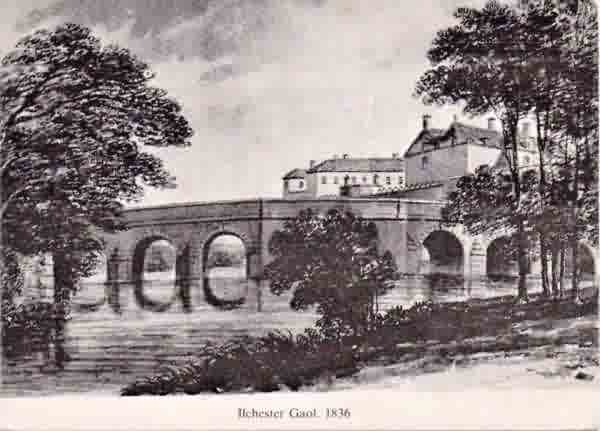
From my
collection
A contemporary sketch of Ilchester Gaol, where all prisoners were taken, escorted by the Yeomanry, and were housed while awaiting trial at the Assizes. One rioter, Edward Miller, served out his one month sentence here and was released as soon as the trial was over - having already been held in Ilchester Gaol awaiting trial for about six months.
The Court Hearings
Seventeen people were charged with various offences, including riotous assembly, at Taunton Assizes in April 1832. Despite modern reports in books (you can guess who originated this myth - yes, well done, it was Mr Hayward again) and the internet claiming that sentences "from 6 days to 18 months" were handed down to the rioters, the Somerset Criminal Register (see Sentences) recorded that fifteen rioters were found guilty of various offences and received sentences ranging from the death sentence (all commuted) to six days imprisonment, while the other three were acquitted.
The following is the full report on the trial of the rioters at the Taunton Assizes of 3 April 1832 from the 9 April 1832 edition of the Western Flying Post. Note: notes in [square brackets] are mine, or from other newspaper reports.
Tuesday - James Martin [aged 15], Thomas Dommet Symes [25], John Gill [27], and Henry Earl [36], were indicted for having, with divers other persons, riotously assembled at the dwelling house of Edwin Newman, Gentleman, and breaking the windows and destroying his furniture. [Mr Ball appeared for Gill. Mr Moody conducted the prosecution, and called the following witnesses] -
Edwin Newman. - "I am an Attorney residing at Yeovil. On Friday, the 21st of October last, at eight o'clock [in the evening], an assemblage of people took place facing my house, they began to throw stones at the house, but the trees [in front] protected it; they remained about ten minutes; there might be fifty persons present. About half-past eleven a violent mob came to my house several hundreds; they attacked the front gate, and, after much difficulty got into the yard, where they commenced breaking my windows and doors with stones, and, I think, sticks. They broke down and demolished the office window and shutters and got into the house; I requested them to desist; I told them I had a loaded pistol, and would fire on them. I went to the office door and addressed them. I said, now they had broken my windows, they had better be off or I would fire at them; they were at that time in the office endeavouring to break the door, and get into the house. At this time I heard very foul oaths and curses. I heard the screams of my wife, who was upstairs [with her two infant children], she being at that time in a very delicate situation, I went to her. Mr Tomkins came and entreated my wife to leave the house, and had it not been for his interference our lives would probably have been lost; my wife would not leave without me; I consented, and we left the house with our children; I passed the front door and there were several hundred persons there at the time. Next morning, between four and five, I returned, to my house, and found my windows, doors, &c a complete wreck; my office door was so much broken that I was obliged to have a new one fixed at the back of the house; the dining room windows were all broken, the frames and shutters nearly the same. [There was only one pane left in front.]; my furniture was injured to a very considerable amount. I have recovered a verdict against the hundred for £250 [about £20,000 at today's value], for damages to . I was engaged in the Dorset election for Lord Ashley."
Cross-examined by Mr Bell - I was one of the agents to Lord Ashley. In that part the street was narrow; it is possible that the people might be innocently pressed into my court.
Mr W Tomkins - I am a surgeon, and reside at Yeovil. On Friday, October 21, about half-past ten, I went into the street; I saw persons passing to Mr White's [Pitney House, Kingston]; I went to Mr White's where the persons assembled were about one hundred; they were breaking the windows. They went from thence to Mr Joseph Mayo's [there is no Joseph Mayo in Yeovil at this time, he must mean Mr George Mayo, Swallowcliffe House, Kingston]; several hundreds were assembled, and threw stones; they forced their way through the gates; there were occasional shouts. From Mr Mayo's they went to Mr Robins's [Market Street], an attorney; I went there and saw they were breaking the windows in all directions with brickbats. I went from Mr Robins's house to Mr Slade's [Market Street, about 50 yards south from Robins'], and then returned and found the numbers had increased; they left in parties, and went and broke some of Mr Slade's windows. From Mr Slade's they went to Mr Newman's [Vicarage Street]. From Mr Slade's they went to Mr Newman's [Vicarage Street - again]. I repeatedly endeavoured to stop the work that was going on, and in doing so placed myself in peril. They at first threw stones at Mr Greenham's house [Vicarage Street, opposite Newman's]; then they attacked Mr Newman's front gate with stones and sticks; I saw they had effected an entrance, and I tried to get into the house, but was resisted some time; when I did get in, I saw them destroying the kitchen furniture; there was a great number in the house; it was with difficulty I made my way through the passage, owing to the number of stones. I saw Mrs Newman, and assisted in getting her to my house [Magnolia House, Princes Street]; I said "I am going to take Mrs Newman and her infant children"; they stopped for a short time, as no man would be so cowardly as to injure them. I took them to my house and returned in abut a quarter of an hour and found an immense mob outside the house, and about 150 in the house. I heard of Mr Goodford's arrival. I think the mob heard of it, as they left the house and went into the street, where he was addressing them; they nearly all left the house; Mr Goodford's address had the effect of quieting them, and induce them to leave Mr Newman's house.
Mr Samuel Rolls - I saw the mob at Mr Newman's house on the Friday night; I went in and found a great many people there; they were breaking the furniture; I went into the kitchen and saw the furniture all scattered about; I saw a pile of furniture and papers in the middle of the stone floor of the kitchen, two or three feet high, and in the grate furniture and papers piled and burning; the pile in the middle of the kitchen was lighted; my own brother kicked it down and put it out; broken furniture and papers were scattered all about; the height of the ceiling is about nine feet; I saw my brother take the fire out of the kitchen grate; he burned his hands slightly.
J Goodford, Esq [of Chilton Cantello] - I am a magistrate of this county. On the 30th October [sic] I heard of the riots at Yeovil; it was about ten o'clock at night. There is no magistrate residing at Yeovil; the nearest lives about a mile and a half distant. My son had dined at Mr Phelips's house, and passing the top of the town, saw a riot, and gave me information; I was partly undressed, but I dressed myself again and got on horseback, and arrived there about a quarter past eleven o'clock [from other accounts, and fitting in with a likely timescale of events, the time was more likely 11:50pm]. I went in front of Mr Newman's house; I was alone; I heard a great noise and breaking in the court and house; a number of persons followed me; I must say many were not engaged in the tumult. On my addressing them, the noise in the street and house ceased almost immediately; the rush was so great from the yard and house, that my horse was driven over the way; they collected about me, and I addressed them, say 500; I expostulated with them; intimidation was out of the question, as I had no force; I said "All that are peaceable and loyal subjects, follow me;" they did so; I repeatedly said so before I went into the inn yard [Mermaid Inn]. Clearing Mr Newman's premises took about a quarter of an hour. I addressed them at two or three other places before I went into the inn-yard. I was called out; I went to the house of the Rev Mr Hooper; they had broken a few windows; I again addressed them; I spoke sharply to them, and succeeded in quieting them by daylight. I was up all night, and reached home about eight o'clock in the morning.
Arthur Trask - I was a special constable that night; I know the prisoner, James Martin; I saw him at Mr Newman's; I saw him throwing stones at Mr Newman's house, about ten or eleven o'clock; many people were there; they were getting into the house; I saw him there, about half an hour after that, outside Mr Newman's door; I heard the noise inside and the furniture breaking; I heard some persons round the door say they would be [damned] if they would not get in again.
Eliza Batting - I saw the prisoner, [Thomas] Symes, on Mr Newman's green, the yard facing his house; I saw him throw two stones through the office window; I heard Mr Newman say that the first that entered his house should be a dead man; Mr Newman was in the passage; I saw him in the back parlour; that was the room in which the prisoner struck a piece of furniture, but did not break in.
George Rendell - I am clerk to Mr Newman; I saw the prisoner, Symes, in front of Mr Newman's house about one o'clock in the morning [this time is unlikely since other evidence points to Goodford addressing the crowd around midnight]; he was moving; Mr Goodford was then addressing the mob; he (prisoner) was using foul language.
James Sutton - I am beadle at Yeovil; I saw the prisoner, [John] Gill, in the garden, at the back of Mr Newman's house; I saw him throw a stone or brick at the chamber-window; I took him by the arm and told him to go about his business; I saw him in the passage of the house about ten minutes afterwards; knew Gill before that time.
Arthur Trask, re-examined - I know the prisoner Gill; I saw him in Mr Newman's kitchen.
Thomas Henry Blake, glover of Yeovil - I know the prisoner [Henry] Earl; on the Friday night I saw him on the green, in front of Mr Newman's house; they had then got into the house; I saw him at that time coming from where the stables are, with something under his arm; I asked him what he had got under his arm; he produced a stick as long and as large as my arm; he said "I am afraid you will split, you watch me so closely." I told him if he knew when it was well with him he would go home and have nothing to do with it; he said he should not go home until it was all over. I saw him about ten minutes after striking the door of Mr Newman's house with a heavy weapon; it broke the panel of the door; then I saw several persons in the house; when the mob saw the door was broken, they made an instant rush, and forced themselves into the house; the prisoner travels the country selling tapes, buying rags, &c. While I was in one of the rooms the stones came round me, and I said "You had better leave, as the soldiers are coming, and you will be taken;" they left the room; I preserved some of the furniture; I saw the prisoner in Ilchester Gaol; he sent me a note; I said "Do you not think you had better have gone home when I spoke to you on the green?" He shook his head, and said "I wish I had."
James Martin said he was at the door, but was innocent of the crime.
Mr Wellington - I have known the prisoner Earl about five years: he is a pedlar, dealer in skins, rags, &c. I never heard any thing against him before this unfortunate affair.
The learned Judge having summed up, the Jury found all the prisoners guilty.
John Curwood, Edward Dodge, Edward Miller, John Baker and Richard Marks, were indicted for riotously assembling, on the 30th [sic - the 30th was a Sunday, a week after the riot] of October, and violently attacking and demolishing the dwelling house of Francis Theophilus Robins, Gentleman, and destroying his furniture.
Francis Theophilus Robins, attorney - I live at Yeovil. On Friday, October 30 [sic] about ten o'clock, I saw a mob, several hundreds, coming down a field in which my house stands; a wall about five or six feet divided my garden from the field; they pushed down the wall; my wife insisted that we should go to the cottage, as the mob could completely surround the house; when I left the house the mob were pushing down the wall; when I got to the cottage I heard the noise of the demolition of my house; the mob shouted "hurrah!" I think they continued two hours; I went to my office [from Watts' 1831 map of Yeovil, the office was probably in Princes Street, to the immediate south of Glenthorne House] from the cottage, as I heard that they were going there; I went to my house between twelve and one o'clock; the principal part of the mob were gone, the widows and inside shutters and doors were entirely demolished, and some of the inside doors (cupboard doors) thrown down; the furniture of the lower part of the house was completely destroyed; every window in the house was destroyed; the damage amounted to £300, about £30 of which was for the house.
Cross examined by Mr Gunning - I think the number of the mob was about 500; they might, if they chose, have destroyed the whole house.
Mr Tomkins - They left Mr [George] Mayo's, and went in two bodies to Mr Robins'; I went by the back way to his house; I was at some distance, standing in an out-house; at that time they were breaking the windows , and apparently getting into the house; I got over the wall, and went to the front; saw them enter the house in considerable numbers through the dining and drawing-room windows; I went into the house; I saw them destroying the book-case and chimney ornaments; I said "What business have you here?" Mr Robins is an inoffensive man. They were making a great noise and and bawling out "Reform!" They asked me if I was for reform; I said "Yes, but not for a reform that is to be effected by brick-bats, or by pulling a man's house about his ears;" I said it was infamous conduct; they would be marked, and they should not proceed; every one then left the room; they got out of the window, and went into the lawn; I heard some one say upstairs, either that the house would be burned, or they would set fire to it; I met one man running down stairs by me as I went up; there were two or three persons there; I believe they had a candle; as one was put down; several stones were thrown through the passage-window, some struck me; I locked three room doors, and gave the keys to Mr Robins' servant; I think in the two parlours there were 50 persons destroying the furniture, and about 500 outside; I heard at that time the mob were going to attack his office; I went to Mr Robins at the cottage; I went with him to the office; he removed his papers; I offered to defend the house with Mr Robins; I went then to Mr Slade's [between Robins' house and the Pall in Market Street], and from thence home [Magnolia House], and returned to Mr Slade's; when I returned to Mr Robins' house, I found things destroyed; I saw a man in a fustian jacket sweeping rows of china down with a large stick; I spoke to this man; he struck at me with a stick; the mob were still occupied by breaking the furniture; I came away and left many there; it did not appear that the chief object of attack was the windows and furniture.
John Critchell - I am a cabinet-maker at Yeovil. When I came to Mr Robins', about ten o'clock [this has to be at least an hour too early since according to Robins, the mob started their attack around ten o'clock], the greater part of the mob were gone; I saw the parlour grate full of wood, partly furniture, and part of a trellis portico of the door; I took it from the fire; it was burning; a book and table cloth were in the fire; I continued in that room till the fire was extinguished; I saw the prisoner, [John] Curwood, in front of the house, and a man was jumping on a table, thrown out of the house; I remonstrated with him; the prisoner, Curwood, said "What business is it to you, will it not make it the better for your business?" I saw him again in the front passage of the house; he had a stick in his hand.
Thomas Hall - I am a stone-mason. I saw Curwood there; he was in the dining room; he had the leg of a table in his hand; he was beating about the things in the house; I said "John, you had better go home, it will be better for you another day." I was trying to take the bellows out of the fire, when he took up the leg of a table to strike at me; I said "You will beat my brains out if you strike me with that;" he flung it at me; it struck me in the back part of my neck; I then left, and met Curwood in the passage; he called me indecent names, and said I was there for a watch; he met me again at the back part of the house, and said I should catch it some other day; he was tipsy; I saw Edward Dodge in the kitchen; he was beating and destroying the things and window.
John Barber - I am one of the constables of Yeovil. I know Edward Miller, he was with the mob at Mr Robins' house; I was sorry to see it; he was beating the garden door going into the green with a walking-stick; the door was forced open by a man with his foot.
John Harvey - I live close by Mr Robins' house. I saw the prisoner, Marks, kicking about the furniture thrown out of the window on the green; he was much in liquor; I desired him to go home; he staid there two hours.
John Barber, re-examined - I saw Marks in Mr Robins' parlour; I ordered him out; he was tipsy, and pulling about the furniture; saw John Baker, the prisoner, go to a closet in the kitchen and take two bottles; I caught him by his sleeve; some young man stood with a stick in his hand as if to strike me; I let him go; I followed him into the field; I looked up into his face and said, "Baker, you ought to be ashamed of yourself; your master is on the premises protecting the property."
John Critchell - I saw Baker on the premises of Mr Robins; my son gave him some knives and forks to take care of; he gave them up; he has worked for me more than twelve months; I never found any thing dishonest in him.
Robert Hann - I am a leather-dresser; I have known the prisoner, John Curwood, ten years; he lodged in my house two years; I never heard any thing against his character.
Abraham Parker - I know the prisoner [Edward] Dodge; I went out with the prisoner; there were seven of us in the company; about eight or nine o'clock we heard the noise; we went to see what was the matter, and returned home at half past eleven; Dodge was not out of my sight, nor in any house; we stood back behind the people; we returned home, and went to work; we shouted peace and quietness all the time we were out.
Susan Wood - I am a witness for Edward Dodge. On the night before mentioned I met him and several others near Ram Park, at about ten o'clock; we remained there until near eleven, and then retired; the prisoner, Dodge, was with us; he never left us; I did not hear any of our party shout; they said it was a shame; we called out "Peace." When we came home we went to work, for we had some to carry in the next day.
Joseph Stainer, baker - I was near the Kingston-gate, at Mr Mayo's [Swallowcliffe House]; I have known the prisoner, Edward Miller, for four or five years; I left the gate and went and stood by the prisoner's side, I spoke to him, and said "Give me the stick;" he replied "I am a cripple, and cannot walk without it." The mob then left and went to Mr Robins' house; I went with him as far as Sheep-lane [today's North Lane]; he turned down the lane to go to his own house. It was impossible for him, in his crippled state, to have joined the mob; during the time I have known him, no man could be more peaceable.
Mr G Wellington - Miller was in my employ for two or three years; I have known him from ma child; I have never heard any thing against him; he was lame before the riots.
Mr Tomkins also gave Miller a good character.
Mr Wellington - I have known the prisoner, Marks, from a child, and never heard any thing against him.
Josiah Adams - I have known the prisoner, Baker, for three or four years, and have always considered him a peaceable and quiet man.
The learned Judge having summed up, the Jury returned a verdict of Not guilty.
James Gard and Edward Miller were indicted for having, with divers other persons, riotously assembled, armed with a bludgeon, and continuing so as to assemble after the Riot Act had been read, and with having thrown a stone or other missile at the window of the Mermaid Inn, in Yeovil.
Thos. Hoskins, Esq. - I am a magistrate in the neighbourhood of Yeovil. There was a meeting of the inhabitants and magistrates on Saturday night, at the Mermaid Inn; I arrived at the Mermaid at about six o'clock; I found several hundred persons in the street, showing a great disposition to riot; about a quarter before seven o'clock we heard that something was going on at Mr Hooper's; it was determined that the Riot Act should be read; I read it; as soon as they understood the purport of the Riot Act, they ceased to throw stones, and received us with yells and hisses; the lantern was then broken; I took a man, with a stone, into custody, but they rescued him again; after a little time, they seemed to disperse from that part; I walked about the streets, but saw no rioting; there were many people about; the [Mudford] Yeomanry were on the outskirts of the town. I was at the Mermaid with two other Magistrates; the two prisoners were brought in there; there was a cry of "Rescue the prisoners!" I immediately said "Shut the gates;" they were no sooner shut than a thundering was made at the gates with, I suppose, stones and sticks; I then went out at the back gate to fetch the Yeomanry; in a few minutes they came up; they had a magistrate with them; they dispersed the mob before I came back.
J Goodford, Esq. - I apprehended one of the prisoners; I was outside the Mermaid when the gate was shut; I saw them hurl stones against the windows, and beat the gate with large sticks; the cry was "We will have the prisoners out, down with the house." The gate was opened for me; I got in as soon as I could; I could not hear the same cry when I was inside; the prisoners were not rescued, nor the house pulled down; the troop soon cleared the streets, but peace was not restored till some time after.
Wednesday - John Curwood, Richard Marks, John Baker, Eliza Hodges and Jacob Vagg, were indicted for having riotously assembled, with divers other persons, at Yeovil, to the disturbance of the public peace.
John Harvey - I am a plasterer, living at Yeovil. I saw the prisoner, Richard marks, kicking the furniture about on the green at Mr Robins'; I desired him to go home and let it alone; he was drunk.
John Barber, constable, of Yeovil, stated that the prisoner was in Mr Robins' parlour; he was kicking the furniture about; he was drunk.
Mr Wellington knew the prisoner Vagg; his character was good.
John Barber knows the prisoner Vagg; gave him a good character.
Mr Wellington - I took a woman into custody, when I saw stoop and take up stones and break the windows; the prisoner at the bar is the woman; the mob rescued her.
George Lugg - I saw the prisoner Hodges throw stones, and Mr Wellington took her into custody.
Samuel Sartin - I was in Mr Robins' house on the night of the 20th October; I saw the prisoner Vagg in the pantry of the house; Mr Robins' servant shoved him out into the back-kitchen; I saw him afterwards in another kitchen pulling down some things.
George Saunders - I saw the prisoner Vagg break some china in the pantry; I turned him out; I saw him in there again.
Mr Treasure and Mr Sutton said, they had known the boy Vagg several years, and had always considered him a quiet peaceable boy.
Mr Wellington, Barber and Harvey, gave the prisoner Marks a good character.
G Hill - I have known Eliza Hodges eight or ten years; she is employed in the gloving business; I have never heard anything against her character.
The Jury returned a verdict of guilty against John Curwood, Richard Marks, Eliza Hodges and Jacob Vagg, and acquitted Baker. Curwood and Marks were sentenced to two months, Eliza Hodges one month, and Jacob Vagg six days imprisonment, to hard labour.
George Poole was indicted for stealing ten pounds of beef, and a verdict of Not guilty returned.
Edward Dodge was indicted for stealing two bottles, the property of Mt Francis Theophilus Robins, of Yeovil.
Thomas Harwood - I saw the prisoner in Mr Robins' house; he took two bottles out of the closet; they were corked; he put one in each pocket; some young man asked the prisoner to let him drink; he refused and said he would carry them home to his wife; I said nothing about the two bottles yesterday.
Mr Robins - There is a cupboard in my kitchen where the wine is kept; it is in bottles.
The evidence in favour of the prisoner was nearly the same as yesterday - Guilty - Transportation for life. This prisoner was convicted on a former occasion.
Edward Miller pleaded guilty - One month's imprisonment.
James Gard, Daniel Brown, John Saint and Edward Murray, were indicted for riotously assembling, with divers other persons, on the 21st October, at Yeovil.
J Goodford, Esq. sworn - I was in Yeovil on Saturday the 21st of October; I saw outside the Mermaid from 500 to 1,000 persons; I took a person into custody for exciting the people, and some other person took another; after some little time there was shouting "Rescue the prisoners, and down with the house"; they threw stones and battered the door; I saw the Martock troop; they came from the Ilchester turning; as soon as I could I retired into the inn; they soon dispersed the mob from the front of the Mermaid.
Thomas Hoskins, Esq. sworn - I read the Riot Act about six o'clock [his testimony the previous day reckoned this to be around 6:45pm]; the mob were then engaged in breaking the Rev. Mr Hooper's windows.
Nathaniel Treasure - I am police constable of Yeovil. I was at Yeovil on Saturday; I saw the mob; I saw the prisoner Gard opposite the Mermaid; I heard a person say to him, "Will you stick to me if I go forward to break the windows and release the prisoner?" he said he would; I saw him throw something at the windows, and heard the crash; I was noticed by the mob, and I withdrew; I know the prisoner Saint he is a carpenter; a peaceable man: he lives at Yeovil, but works at Sherborne. James Gard lives at Montacute; he is a stonemason.
Charles Harris - I belong to the Mudford troop; I was at Yeovil on that night; I was not in uniform, having just come off a journey; I assisted them; I saw Gard that night; I was standing at the door of the Mermaid Inn; some one said he had a stick; I went after him and took him; produced the stick with a large knob at the end; the stick was partly concealed in his pocket; when I took him he was going towards Martock.
Thomas Shorland - I am a surgeon at Yeovil. I was outside the Mermaid when the rescue was attempted; I saw the prisoner, Murray, on Saturday, with the people opposite the Mermaid.
George Harbin, Esq., Captain of the Mudford Troop - I saw the prisoner, Saint, advancing at the head of a considerable number of persons; saw him stand his ground; the other rioters dispersed; I ordered him to go home; he said "Damn you, who are you? I did not expect to see such a set of fellows as you, I could lick a score of you"; I said I had an order from the magistrates to clear the street; he said "Damn you and the magistrates too"; at that time he raised a stick; I seized him by the collar; I cannot say whether he was in liquor or not.
Several other members of the troop were called.
Mr Tomkins - I saw repeated attacks made on the Yeomanry; one of the Martock Troop was injured in several places; he was not sensible for some minutes after I saw him.
Mr Bere, counsel for Saint, called his master, Mr Sturges, carpenter of Sherborne, who gave him a good character, but admitted he was in liquor on the night in question. Cornish knew Saint fifteen or sixteen years; is a quiet, inoffensive man.
The learned Judge summed up the evidence in a very clear manner to the jury, who returned a verdict of guilty against all the prisoners - Murray was sentenced to eighteen calendar months, Gard and Saint, to twelve calendar months, and Brown to six calendar months imprisonment - all to hard labour.
The witness Galloway stands committed.
The Sentences
Although recorded in at least one book about Yeovil (surprise, surprise, Hayward got it wrong yet again), as well as on the internet, that the heaviest sentence handed down to the rioters was 18 months, this is in fact untrue. Five rioters were sentenced to death, although all the sentences were commuted. The heaviest sentences finally handed down were two sentences of transportation for life and one of a two-year prison sentence.
Henry Earle, clearly a ringleader, was accused of 'Riotous assembly' and 'Riot, and felony beginning to demolish a House' and was initially sentenced to death, although his sentence was commuted to 'Transportation for Life'.
25-year-old Edward Dodge, also sentenced to death, was also transported for life for two offences; riotous assembly at Robins' house and stealing two bottles of Robins' wine. The gaoler's report stated that Dodge's character was bad and he had previously been convicted of felony and imprisoned for eight months and had been whipped twice.
27-year-old John Gill and 25-year-old Thomas Dommett Symes were both accused of 'Riotous assembly' and 'Riot, and felony beginning to demolish a House'. Both were initially sentenced to death although this was commuted to 'Imprisonment for 2 Years' for Gill and 'Imprisonment for 18 Months' for Symes.
15-year-old James Martin and John Baker were both accused of 'Riotous assembly' and 'Felony beginning to demolish a House'. Martin was sentenced to death but his sentence was commuted to 12 months imprisonment whereas Baker was found 'Not Guilty'. Below are the relevant entries from the Somerset Criminal Register.

Although this isn't very clear (and I've condensed the width by omitting some blank columns) this is the entry recorded in the Somerset Criminal Register concerning Henry Earle who was accused of 'Riot, and beginning to demolish a House' and initially sentenced to death, although this was commuted to 'Transportation for Life'.

Again condensed, these are the sentences handed down to Thomas Dommett Symes and John Gill. Both were accused of 'Riot, and fel(on)y beginning to demolish a House' and both were initially sentenced to death although this was commuted to 'Imprisonment for 18 Months' for Symes and 'Imprisonment for 2 Years' for Gill. At his trial, 25 Yeovil inhabitants had petitioned for Gill's clemency, the grounds for clemency (Petition Details) being: Previous good character; dependent family.

Again condensed, James Martin and John Baker were both accused of 'fel(on)y beginning to demolish a House'. Martin was sentenced to death but his sentence was commuted to 12 months imprisonment but Baker was found 'Not Guilty'.
| THE RIOT OFFENCES , VERDICTS & SENTENCES | |||
| NAME | OFFENCE | VERDICT | SENTENCE |
| James Martin | 1 - Riotous assembly at Newman's | Guilty | |
| 2 - Felony beginning to demolish a House | Guilty | Death commuted to 12 months imprisonment | |
| Thomas Dommet Symes | 1 - Riotous assembly at Newman's | Guilty | |
| 2 - Riot & felony beginning to demolish a House | Guilty | Death commuted to 18 months imprisonment | |
| John Gill | 1 - Riotous assembly at Newman's | Guilty | |
| 2 - Riot & felony beginning to demolish a House | Guilty | Death commuted to 2 years imprisonment | |
| Henry Earle | 1 - Riotous assembly at Newman's | Guilty | |
| 2 - Riot & felony beginning to demolish a House | Guilty | Death commuted to transportation for life | |
| Edward Dodge | 1 - Riotous assembly at Robins' | Guilty | |
| 2 - Stealing 2 bottles of wine | Guilty | Death commuted to transportation for life | |
| John Curwood | Riotous assembly at Robins' | Guilty | Imprisonment for 2 months |
| Edward Miller | 1 - Riotous assembly at Robins' | Not Guilty | |
| 2 - Offence not detailed but Miller pleaded guilty | Guilty | Imprisonment for 1 month | |
| John Baker | 1 - Riotous assembly at Robins' | Not Guilty | |
| 2 - Felony beginning to demolish a House | Not Guilty | ||
| Richard Marks | Riotous assembly at Robins' & breaking furniture | Guilty | Imprisonment for 2 months |
| Elizabeth 'Eliza' Hodges | Riotous assembly at Robins' | Guilty | Imprisonment for 1 month |
| Jacob Vagg | Riotous assembly at Robins' | Guilty | Imprisonment for 6 days, Hard Labour |
| James Gard | Riotous assembly at Robins', stoning Mermaid | Guilty | Imprisonment for 12 months, Hard Labour |
| Daniel Brown | Riotous assembly at Robins', stoning Mermaid | Guilty | Imprisonment for 6 months, Hard Labour |
| John Saint | Riotous assembly at Robins', stoning Mermaid & | Guilty | Imprisonment for 12 months, Hard Labour |
| using violent language against the Yeomanry | |||
| Edward Murray | Riotous assembly at Robins', stoning Mermaid | Guilty | Imprisonment for 18 months, Hard Labour |
| George Poole | Stealing 10 lbs of beef from Robins' house | Not Guilty | |
| Thomas Galloway | Riotous assembly at the Mermaid Inn | Guilty | Imprisonment for 18 months, Hard Labour |
Edward Dodge
(main crime
stealing wine)
was originally
sentenced to
death, but this
was commuted to
transportation
for life. He was
removed
to the
Convict Hulk,
Captivity,
Devonport,
on 23 April
1832. He had
previously
served one year
for assault, he
had
also served 8
months and
received a
whipping for an
un-named
felony.
At his trial, 23
Yeovil
inhabitants had
petitioned for
clemency, the
grounds for
clemency
(Petition
Details) being:
Not a ringleader
or active
rioter;
malicious
prosecution;
family dependent
on his wages.
Henry Earle
(main crime
rioting) was
originally
sentenced to
death, but this
was commuted to
transportation
for life. He was
removed to the
Convict Hulk,
Captivity,
Devonport, on 16
May 1832. He had
previously
served one year
for an un-named
felony.
The
Captivity
was used as a
prison hulk from
1802 until 1834. Both Henry
Earle
and Edward Dodge sailed
from Plymouth on
4 October 1832
aboard the
Circassian,
carrying 192
convicts and
bound for Van
Dieman's Land
(today's
Tasmania). The
Circassian
arrived at
Hobart on 16
February 1833.
Edward
Miller, having
served his one
month sentence
at Ilchester
Gaol, by
expiration was
released on 29
April 1832. He
had been
detained for six
months and 7
days!
![]()
![]()
(in 1841, at
the age of
25, Vagg was
arrested and
tried for
desertion
from the
Royal Navy)
![]()
![]()
![]()
The following abridged notes are from my book "Crime & Punishment in Yeovil" -
Ilchester Gaol
During the
twelfth century,
Ilchester was
the county town
of Somerset.
There was a gaol
in Ilchester
from about 1166,
but a new Gaol
and House of
Correction were
built at
Northover, on
the north bank
of the River
Ivel, opening in
1615. It was
also known as
Ilchester County
Gaol and
Bridewell. In
its heyday,
Ilchester Gaol
held up to 270
inmates - men,
women and
children.
Ilchester Gaol
closed in 1843
when the County
Gaol moved to
Taunton.
Prisoners
awaiting trial
for the Yeovil
Reform Riot were
held here - in
conditions that
would absolutely
horrify us
today.
One of the rioters, Edward Miller, having served his one month sentence in Ilchester Gaol, by expiration was released on 29 April 1832
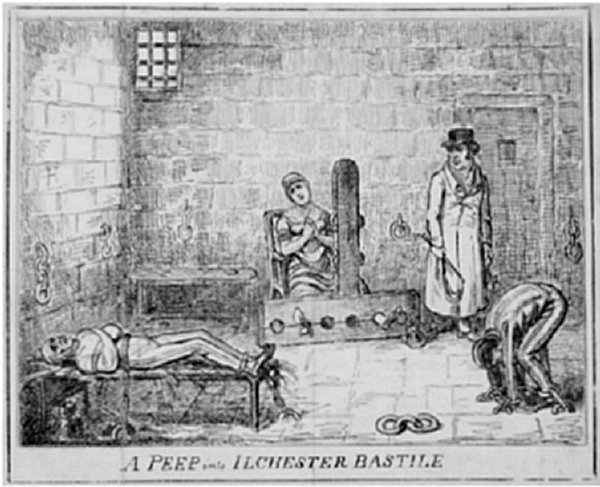
An etching by Thomas Dolby, dated 1818, entitled “A Peep into Ilchester Bastile”. It depicts a jailer holding a scourge and keys standing by the door, scowling at an emaciated man, heavily shackled to the floor and lying on the frame of a bedstead. A man in a striped prison suit is bent double because his ankles and wrists are chained to the floor. A woman sits with her legs confined in stocks.
Wilton Gaol, Taunton
A House of Correction, known as Wilton Gaol, was built around 1755 on what is now Upper High Street. This was enlarged in 1815 and became the County Gaol for Somerset in 1843 after Ilchester Gaol closed. Wilton Gaol was built to a T-shaped plan, with a long, three-storey range and a higher polygonal tower. The original cross-wing has been demolished, but the long range and tower are still standing.
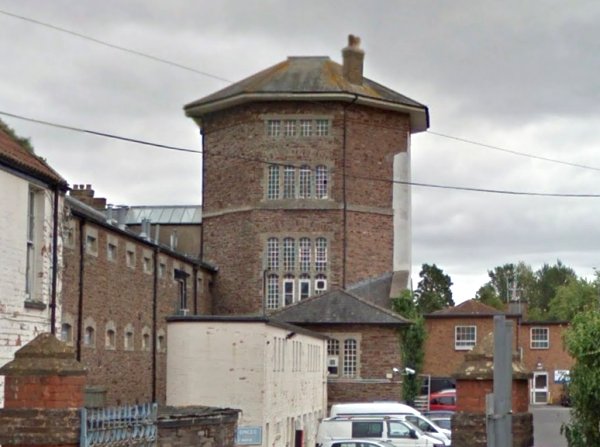
The central tower of Wilton Gaol, with one wing of the long, three-storey range visible to its left. Photographed in 2020.
Shepton Mallet Gaol
Shepton Mallet
Gaol
was
rebuilt between
1830 and 1832.

Albeit not from a local prison, this photograph of 1902 shows prisoners ‘climbing’ the treadmill. Any ‘hard labour’ (see next paragraph) use of a treadmill locally would have been at Shepton Mallet gaol.
Hard
Labour
'Hard labour'
was a form of
forced labour
used as a
supplementary
form of
punishment, in
addition to
imprisonment
alone.
Imprisonment
with hard labour
was initially
received into
English law with
the Criminal Law
Act 1776, which
legitimised
prisoners being
put to work
instead of being
transported to
the colonies in
North America,
which, because
of the American
Revolutionary
War, had become
impractical. The
practice of
sentencing ‘with
hard labour'
rapidly spread
throughout
British courts.
Transportation
Penal
transportation
was the
banishment of
convicted
criminals, or
other
undesirables,
out of the
country, often
to a colony for
a specified
term. Later,
specific penal
colonies became
their
destination.
Transportation was seen as a more humane sentence than capital punishment, especially for minor, or non-capital, crimes. For instance, forgery was considered to be a capital crime, but in the 1820s the penalty was reduced to transportation. Depending on the crime, the sentence of transportation was imposed for life, or for a set number of years. While the prisoners may have been released once their sentences were served, they had to make their own way back to England. But, of course, they rarely had the resources to return home.
Transportation, as an alternative punishment for the death sentence, had the advantages of removing the criminal from society and being relatively cheap when compared to housing and feeding a prisoner for years.
Transportation was introduced regularly as part of the penal system in the early eighteenth century, with convicts going to the American colonies. This ended in 1775 with the American Revolution but commenced again in 1787 with convicts being sent to Australia. In 1840 transportation to New South Wales was discontinued but continued to Van Diemen's Land, today’s Tasmania, until 1853.
THE AFTERMATH
One aspect of the riot, usually overlooked, is the cost to the tax payers of Yeovil. The Vestry minutes covering parish expenditure for the year March 1832 to March 1833 noted "A difference in the amount of County Stock of this year over the last year of £407 - was occasioned by the late Riots." The cost to Yeovilians, therefore, amounted to over £600,000 at today's value.
By 1832 people from the middle and working classes had started to form political groups in most of the major industrial areas and MPs became scared that a revolution might occur in Britain and that the working class would execute the nobility as it had in France. Giving people the vote was seen as a way to prevent revolution and so, partly in response to the riots, Parliament passed the 1832 Reform Act.
The act stated that:
-
Those who owned property and earned more than £10 per year got the vote. This was equal to about one in five men.
-
Seats must be created for MPs in new industrial towns such as Birmingham.
-
Seats for MPs from rotten boroughs had to be removed.
There was a mixed reaction to the new political changes. The middle class was happy about the changes, but the working class still could not vote. Elections remained corrupt and the country was still run by the rich.
![]()
Following the riots, in January 1832, attempts were made to create a volunteer force to be known as the Yeovil Infantry Corps. It appears that the force was never formed.
compensation claims
Many thanks to Prof Steve Poole, University of the West of England, for supplying the following information.
| COMPENSATION CLAIMS MADE IN THE WAKE OF THE YEOVIL REFORM RIOT | |||
| NAME | RANK | ADDRESS | CLAIM |
| Edwin Newman | Solicitor | Vicarage Street | £1,000.0s.0d |
| Francis T Robins | Solicitor | Market Street | £500.0s.0d |
| William Lambert White | Solicitor | Pitney House, Kingston | £28.17s.0d |
| John Slade | Solicitor | Market Street | £13.18s.0d |
| Edward Tomkins | Solicitor | Princes Street | £13.13s.0s |
| George Mayo | Glove Manufacturer | Swallowcliffe Ho, Kingston | £29.17s.0d |
| Henry Penny | Glove Manufacturer | The Borough | £19.16s.0d |
| Rev James Hooper | Gentleman | Hendford Manor | £15.0s.0d |
| John Greenham | Magistrate | Vicarage Street | £4.17s.0d |
| George Rossiter | Schoolmaster | Mansion House, Princes St | £6.1s.0d |
| Richard Trehern | Innkeeper | Mermaid Inn | £7.14s.0d |
|
The following are not recorded in the riot reports by name |
|||
| Charles Sanders | servant of Francis Aston, gent, | £5.1s.0d | |
| Ann Collins | servant of Francis Aston, gent, | 18s.6d | |
| Sarah Hix | servant of Francis Aston, gent, | £3.5s.0d | |
| William Brown | £25.18s.0d | ||
| John Hands | Gentleman | £13.18s.0d | |
| John Coch (ie Cox) | High Constable | Hendford | £3.5s.0d |
| TOTAL = | £1,705.16s.6d | ||
The total compensation claim of £1,705 16s 6d equates to about £158,400 at today's value.
gallery
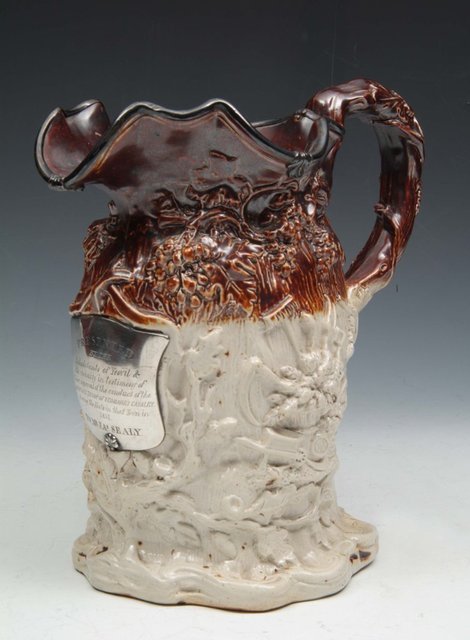
This photograph
features in my
book 'Secret Yeovil'.
This is a salt glaze stoneware Yeovil 'Riot Jug', 9¾" (247mm) high and decorated in relief with a sheaf of corn, farming implements, vine tree and grape decoration and with silver presentation plaque inscribed "Presented by the Inhabitants of Yeovil and its vicinity in testimony of their approval of the conduct of the Mudford Troop of Yeomanry Cavalry during the riots in that town in 1831. To Mr J A S Sealy". The 'Riot Jugs' were made by Doulton & Watts at their Lambeth works. This particular jug was put up for auction in April 2011 but was unsold.
Five of these 'Riot Jugs' are held in the Community Heritage Access Centre.
![]()
In 1831, troopers of the Mudford Troop were dressed as heavy dragoons with black japanned Romanesque helmet with brass fittings and a black crest. The coatee was scarlet with single row of brass buttons down the front. The collar and pointed cuffs were blue and the tunic was piped in blue. Officers wore a gilt loop with button on the collars, but whether other ranks wore loops is unknown. Trousers were dark blue with scarlet stripe. The Mudford Troop was disbanded in 1838.
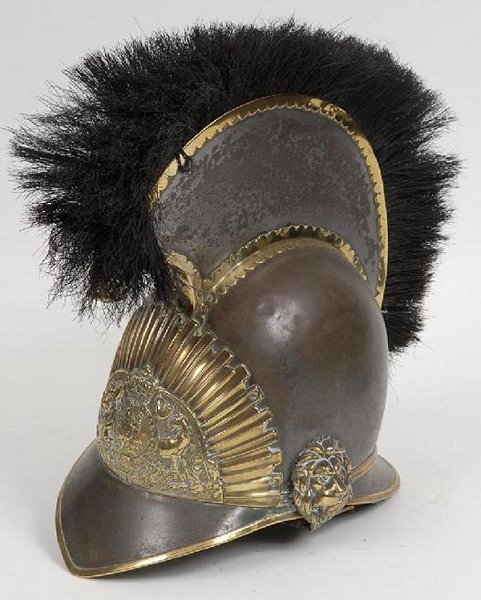
This photograph
features in my
book 'Secret Yeovil'.
A Yeomanry Cavalry helmet of steel and brass construction with a black plume and a Royal Coat of Arms on a sunburst plate. Worn by the Mudford Independent Yeomanry Cavalry. This was auctioned in 2007.
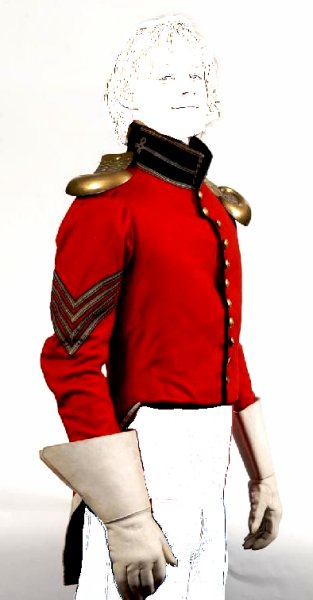
A Sergeant's tunic of the Mudford Yeomanry Cavalry, complete with brass epaulettes and gloves of c1830. The troop was raised by Capt. Harbin of Newton Surmaville. This tunic was auctioned in 2007.
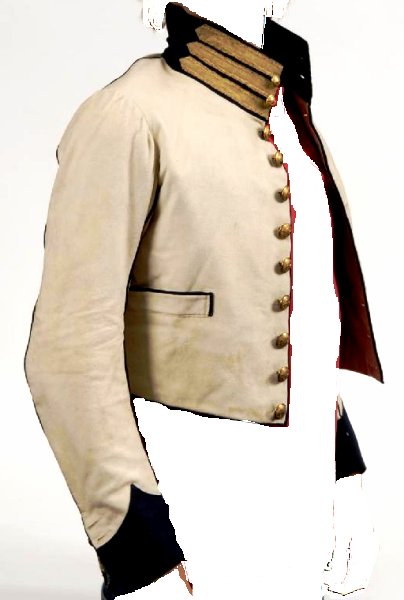
An officer's waistcoat of the Mudford Yeomanry Cavalry, complete with brass buttons. This waistcoat was auctioned in 2007.